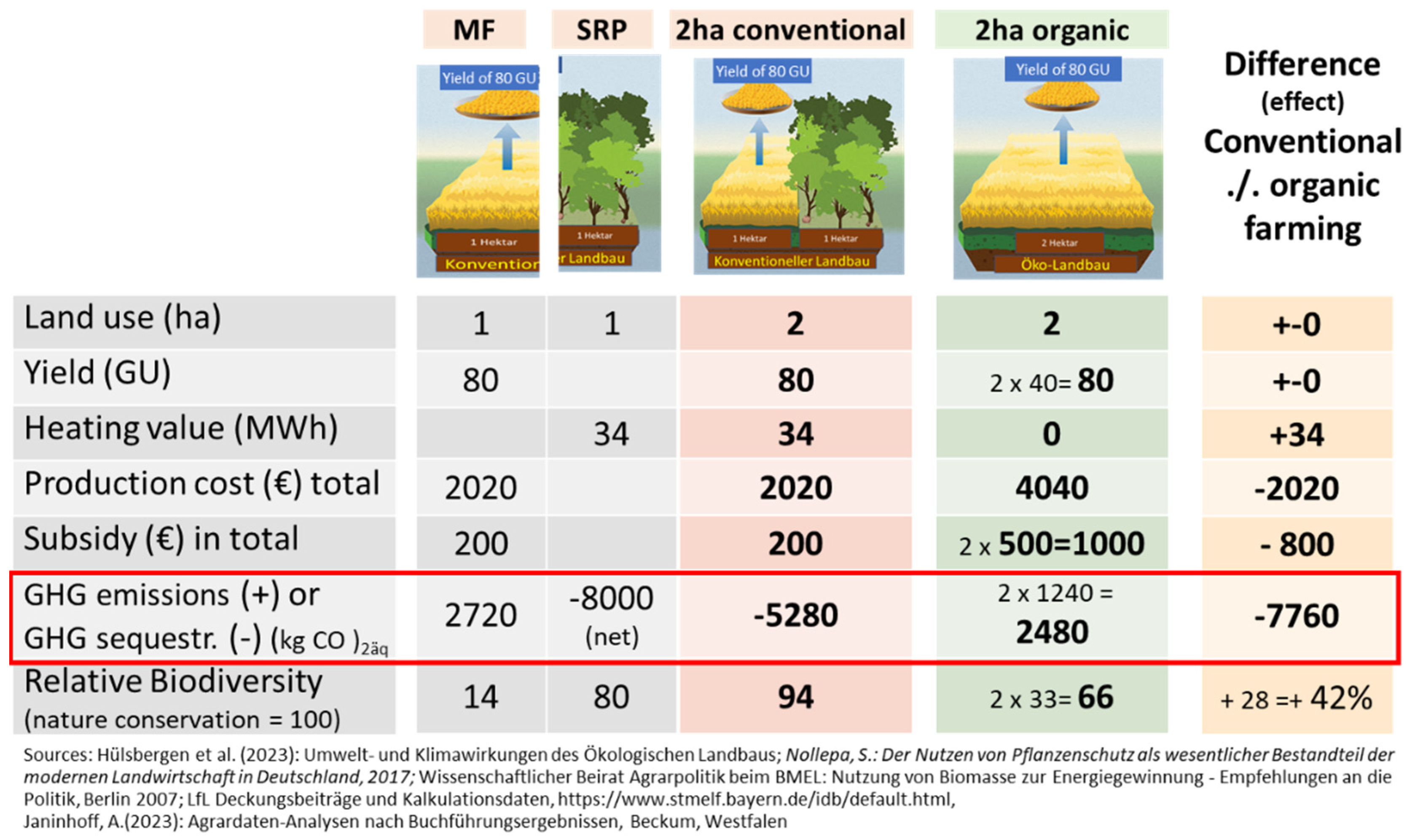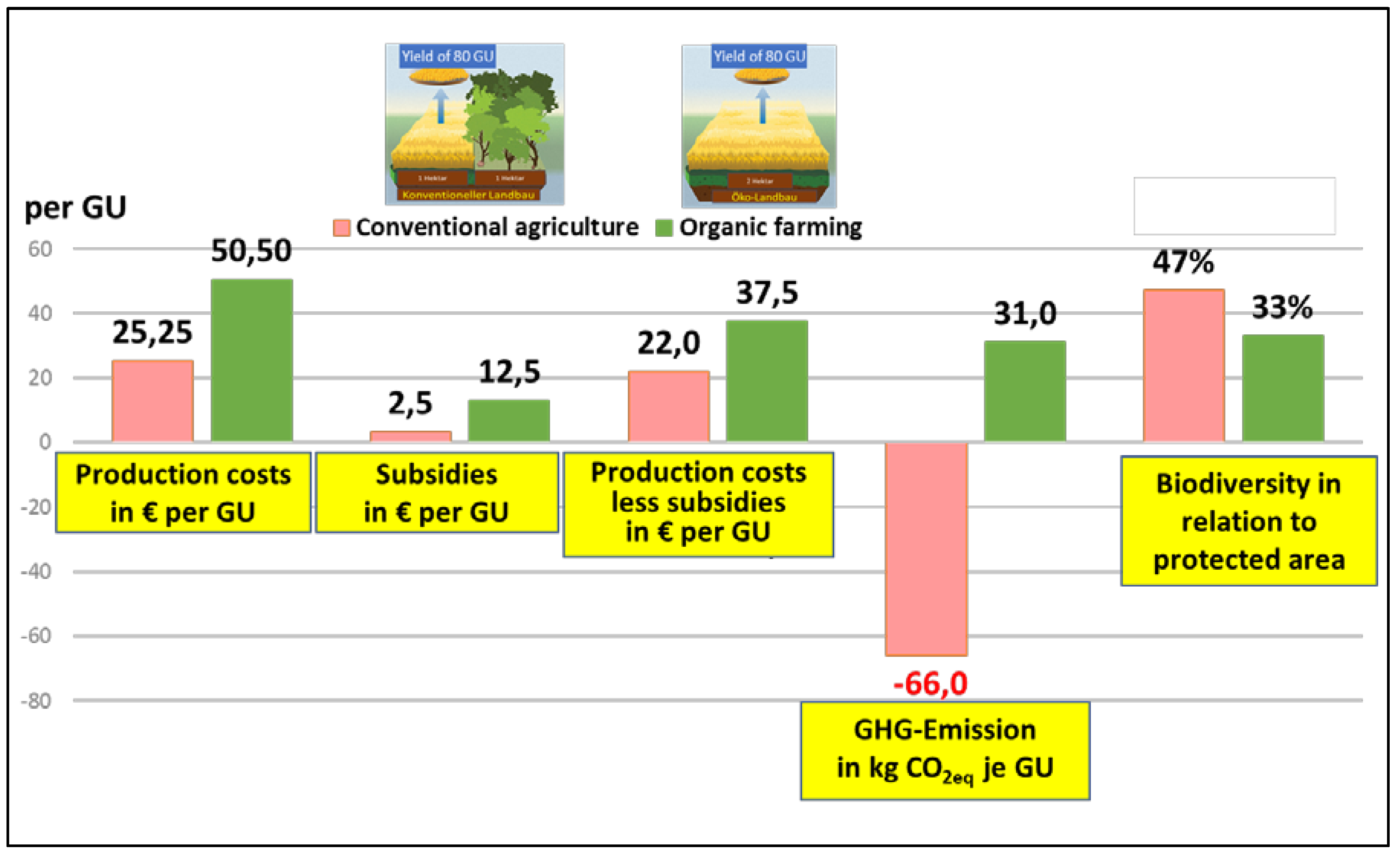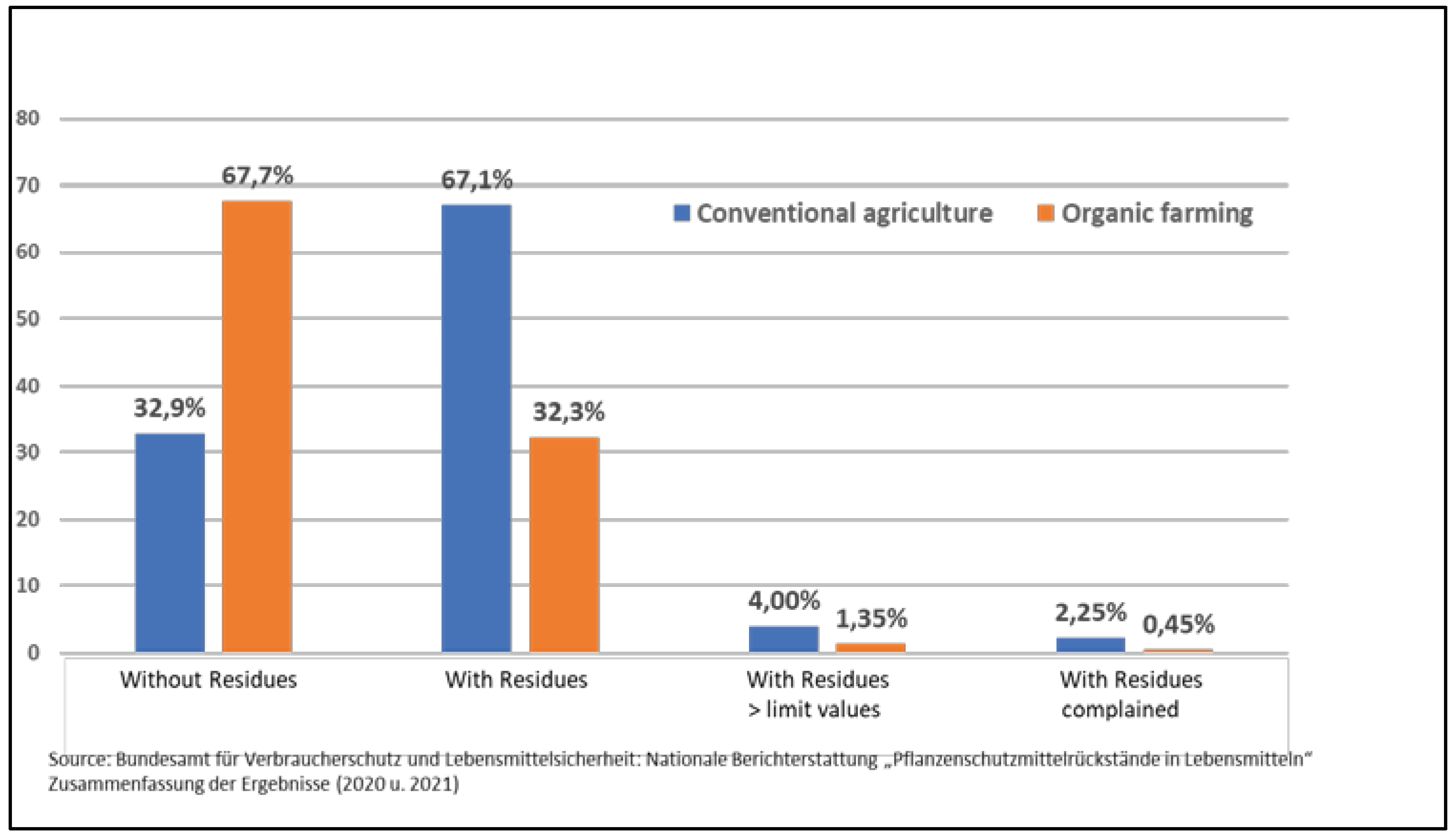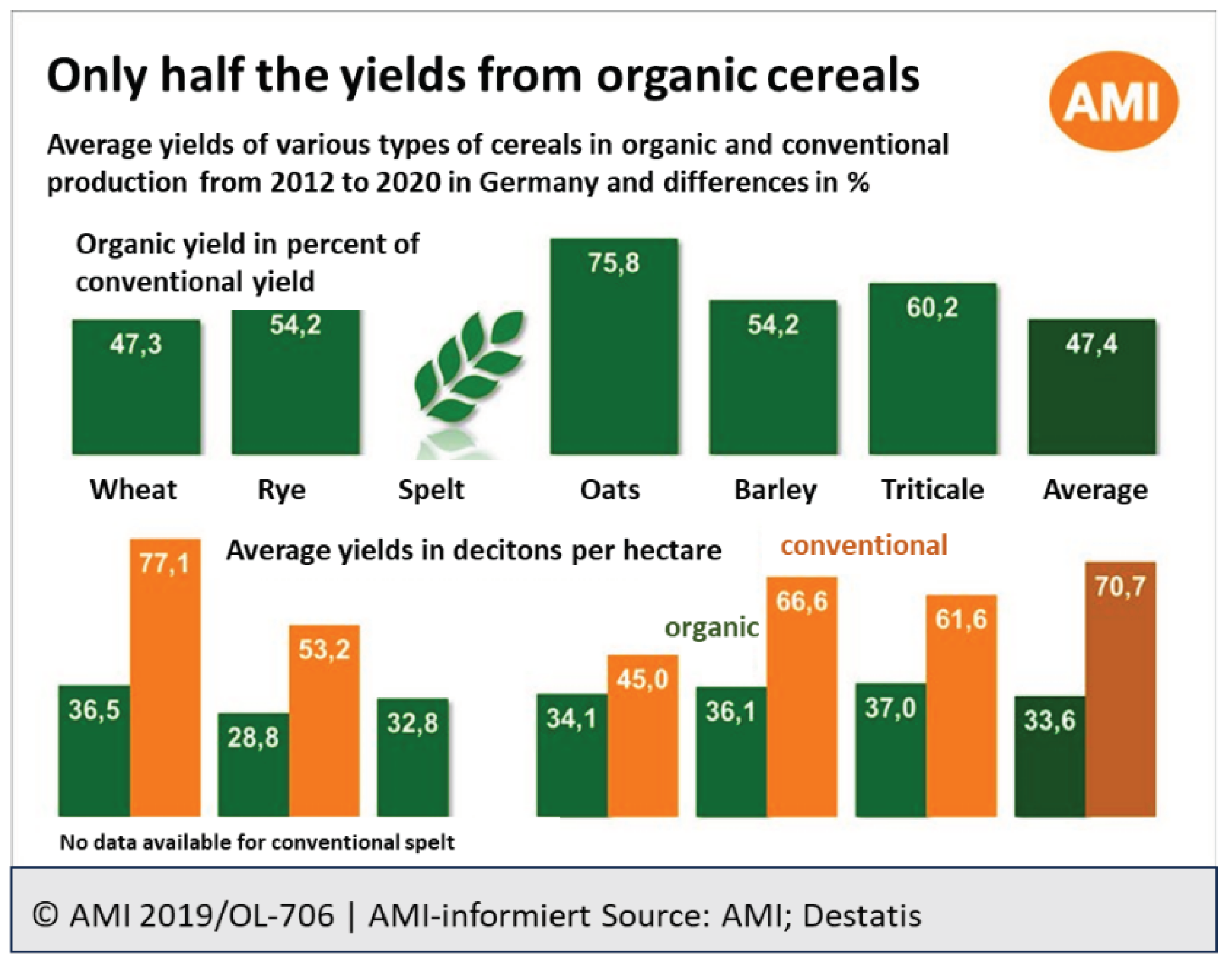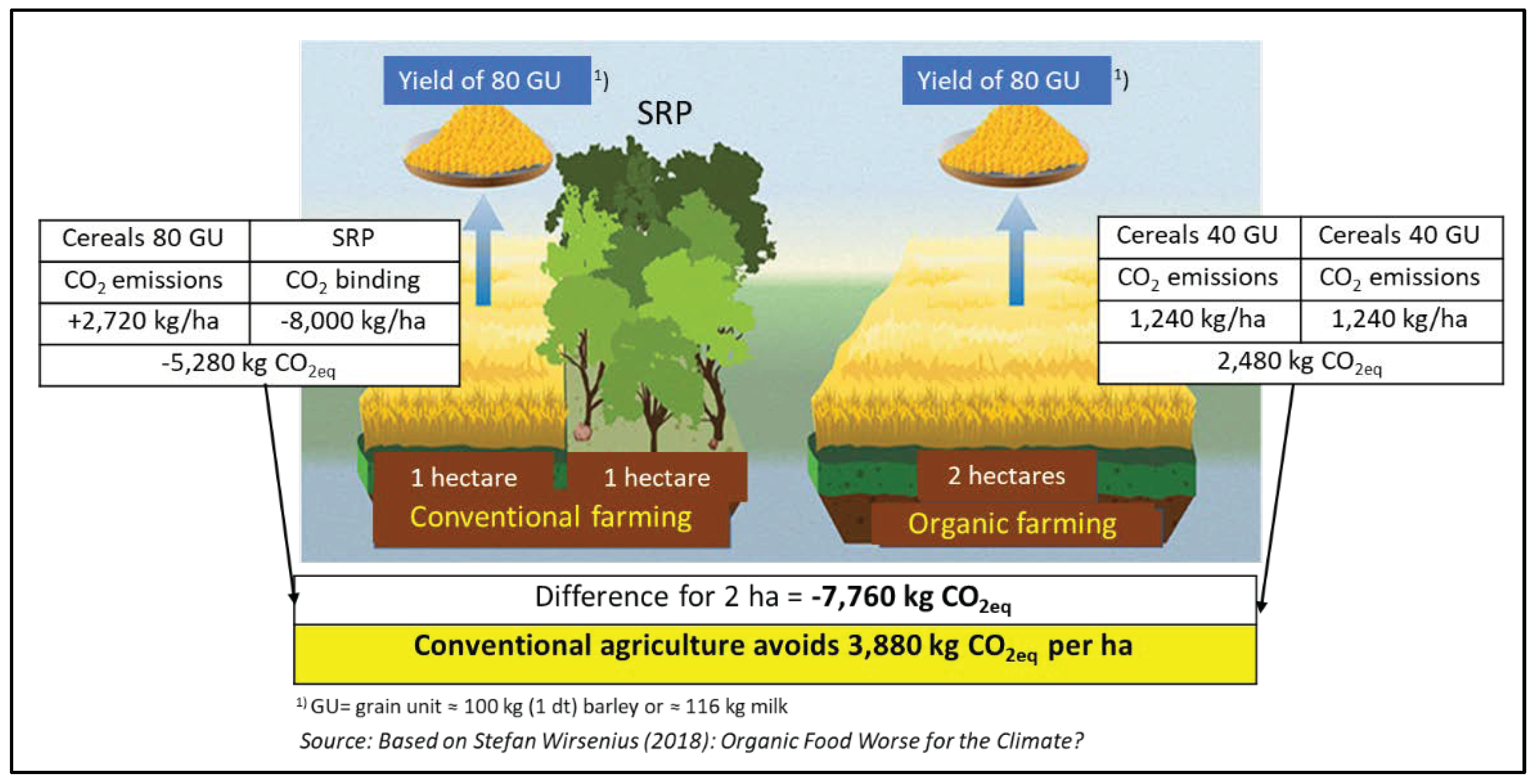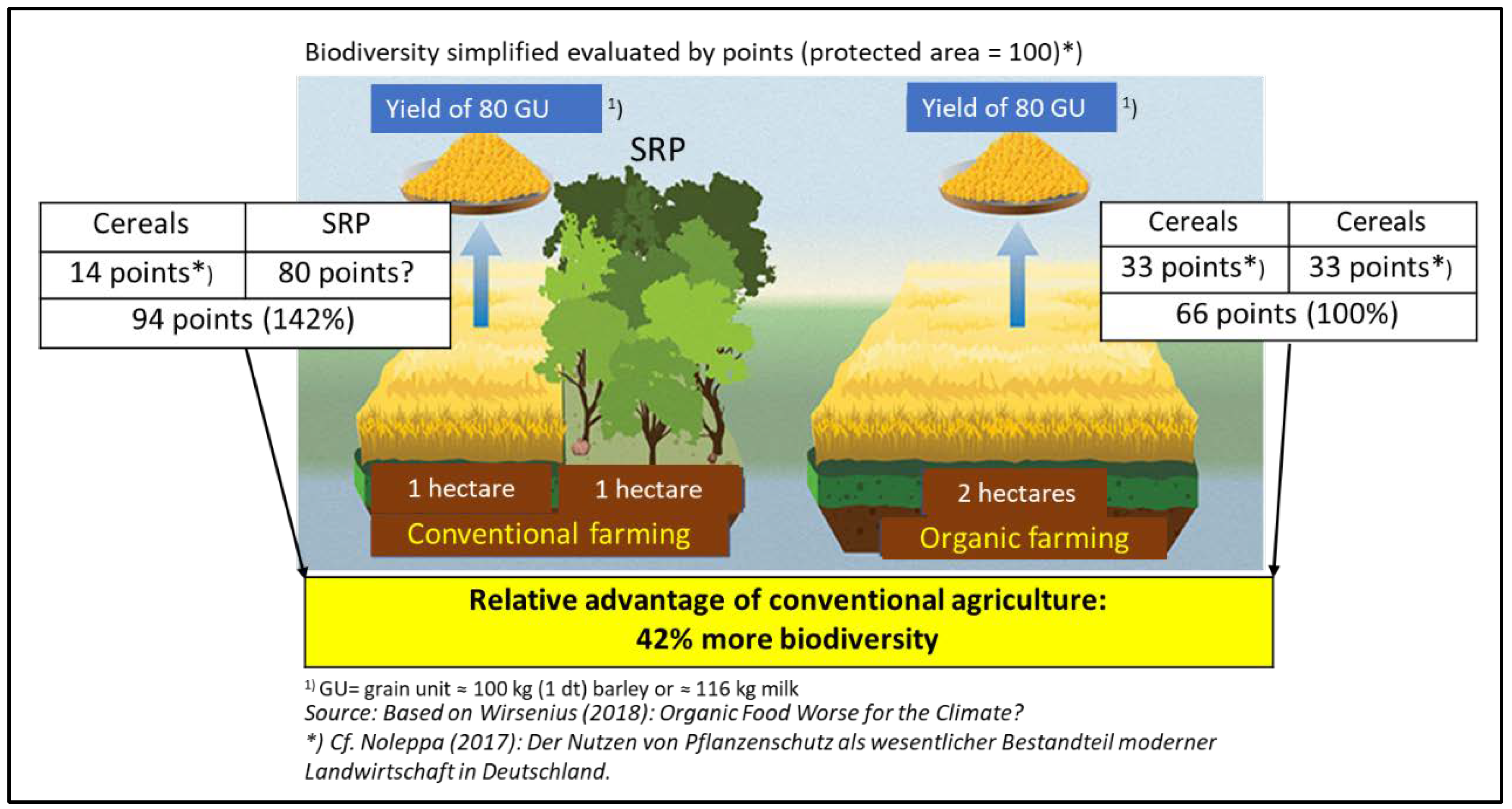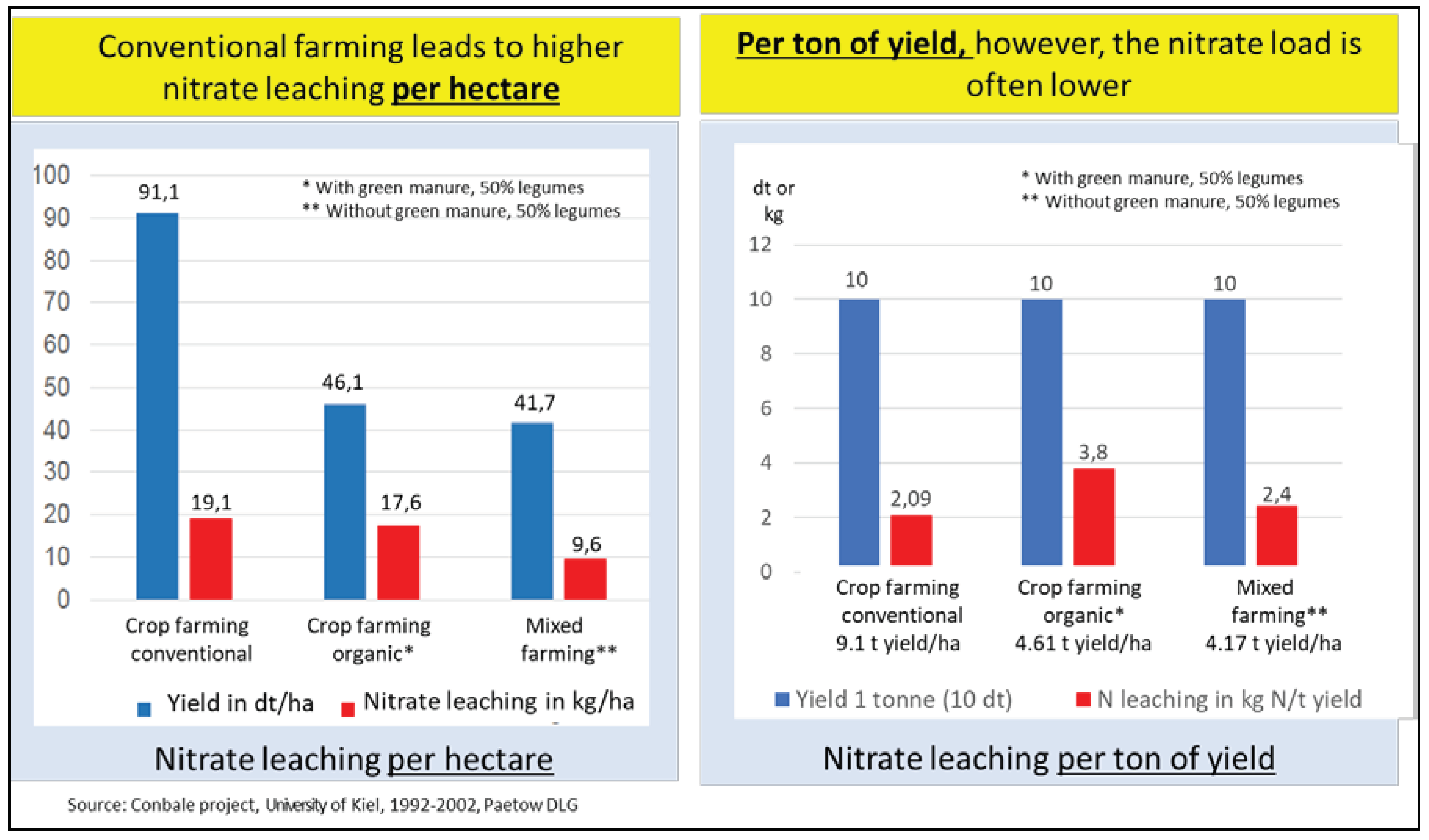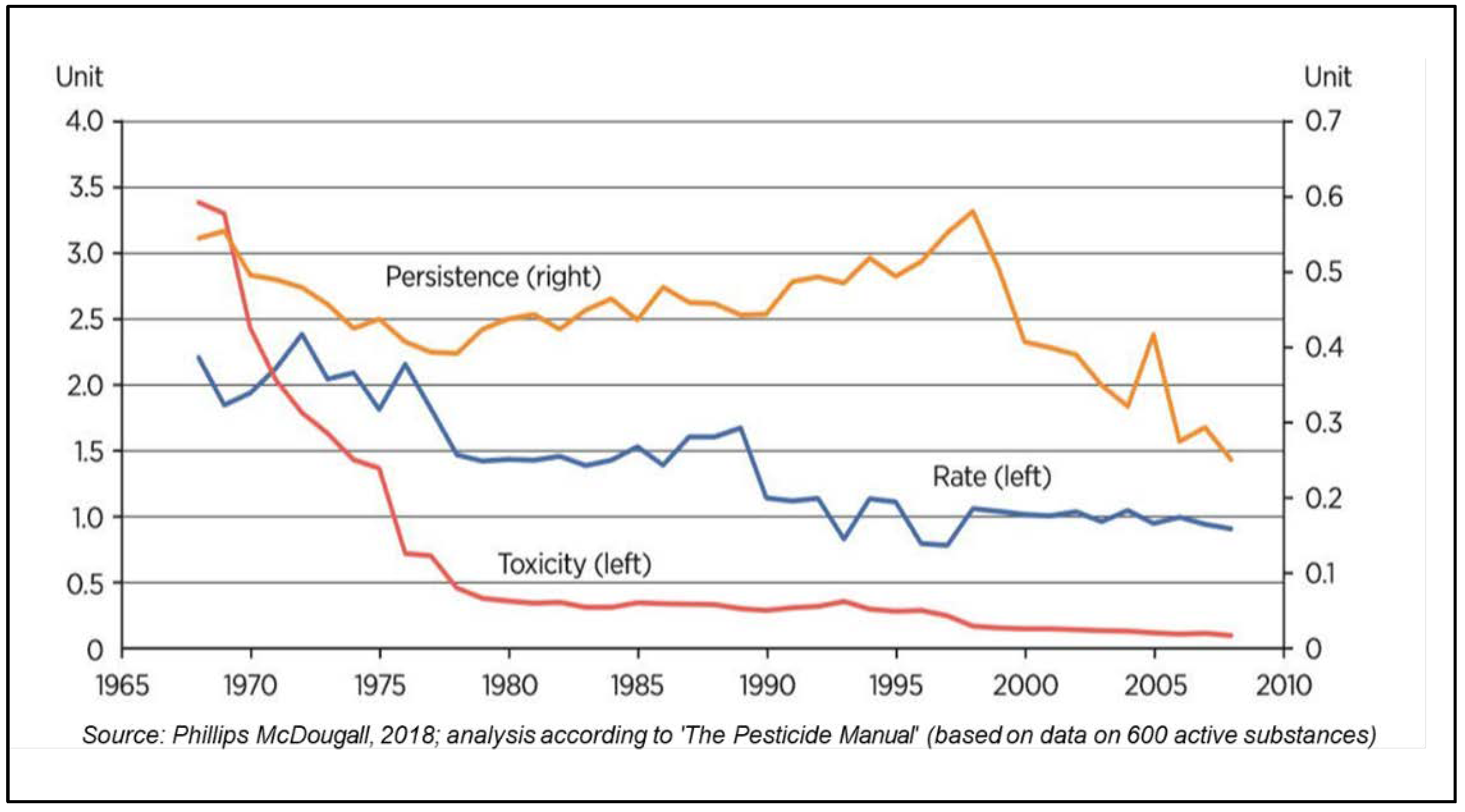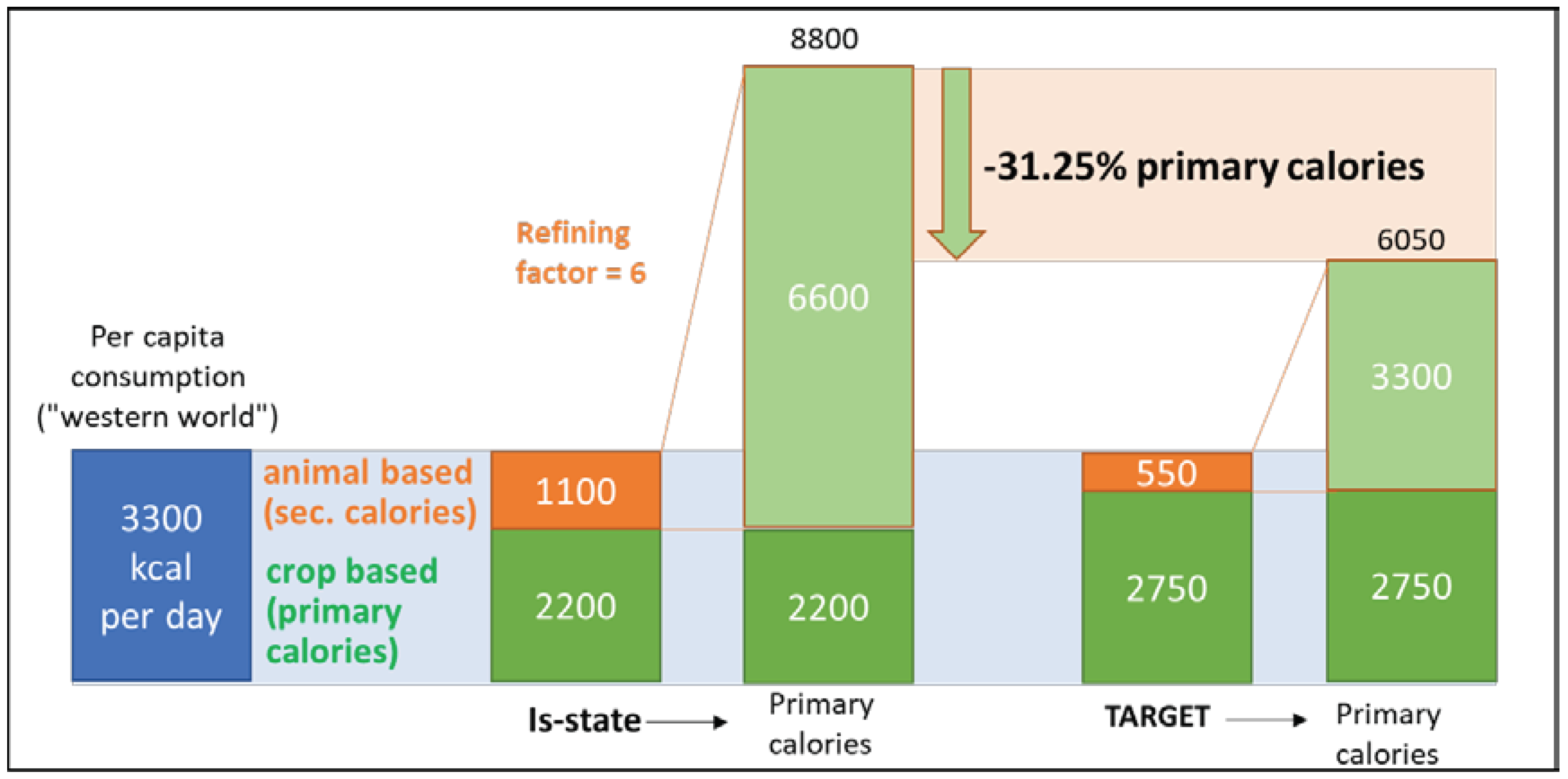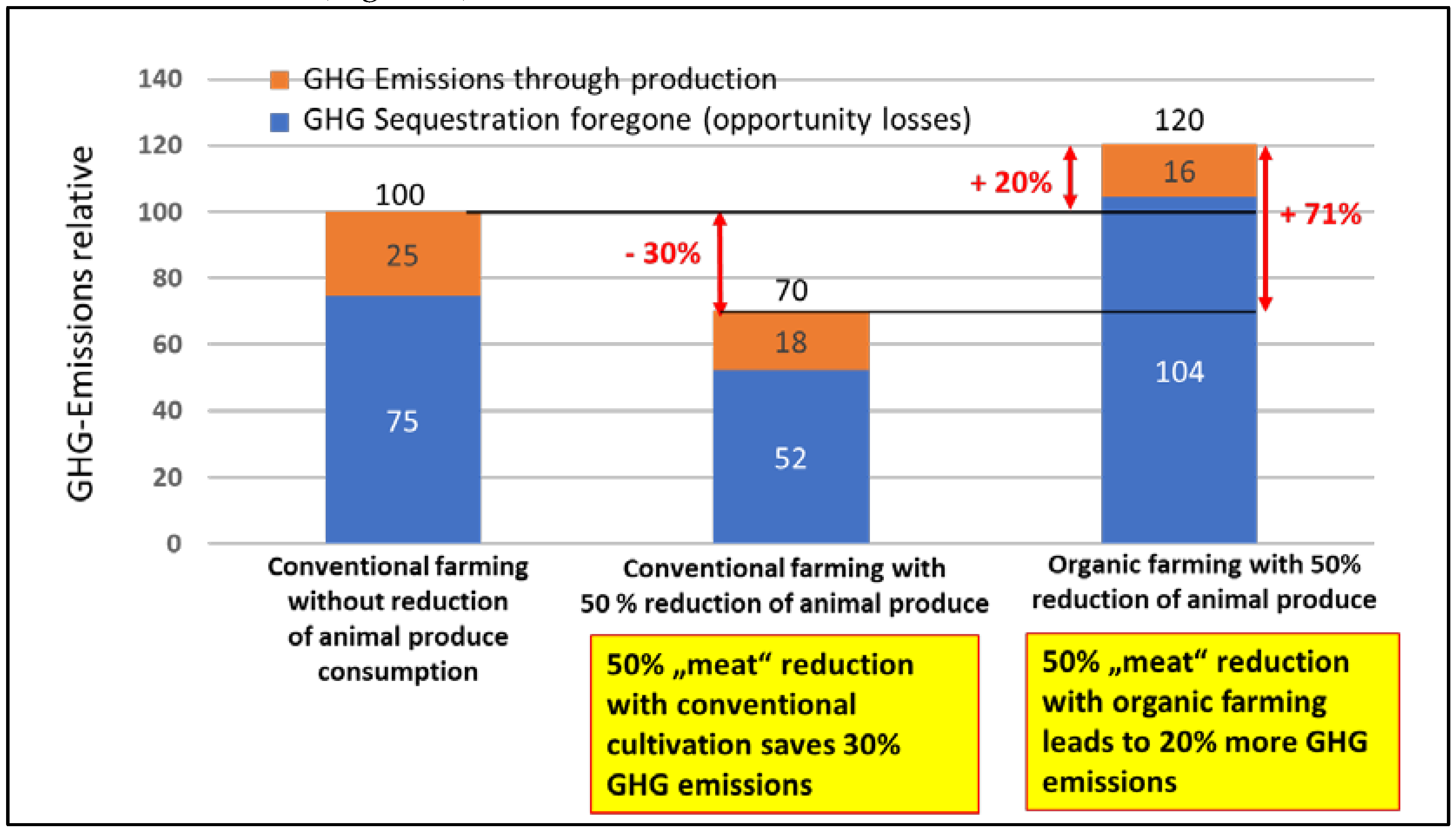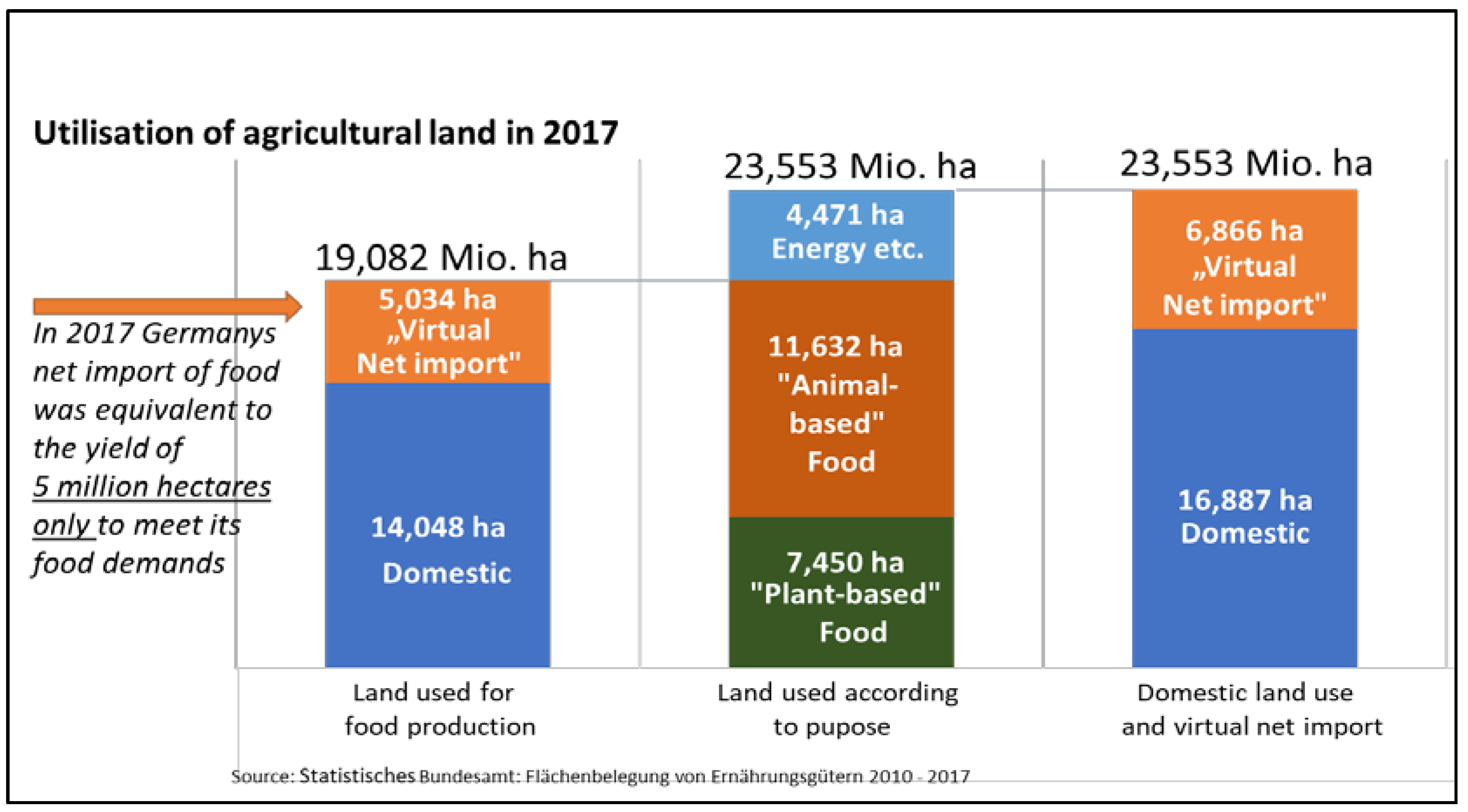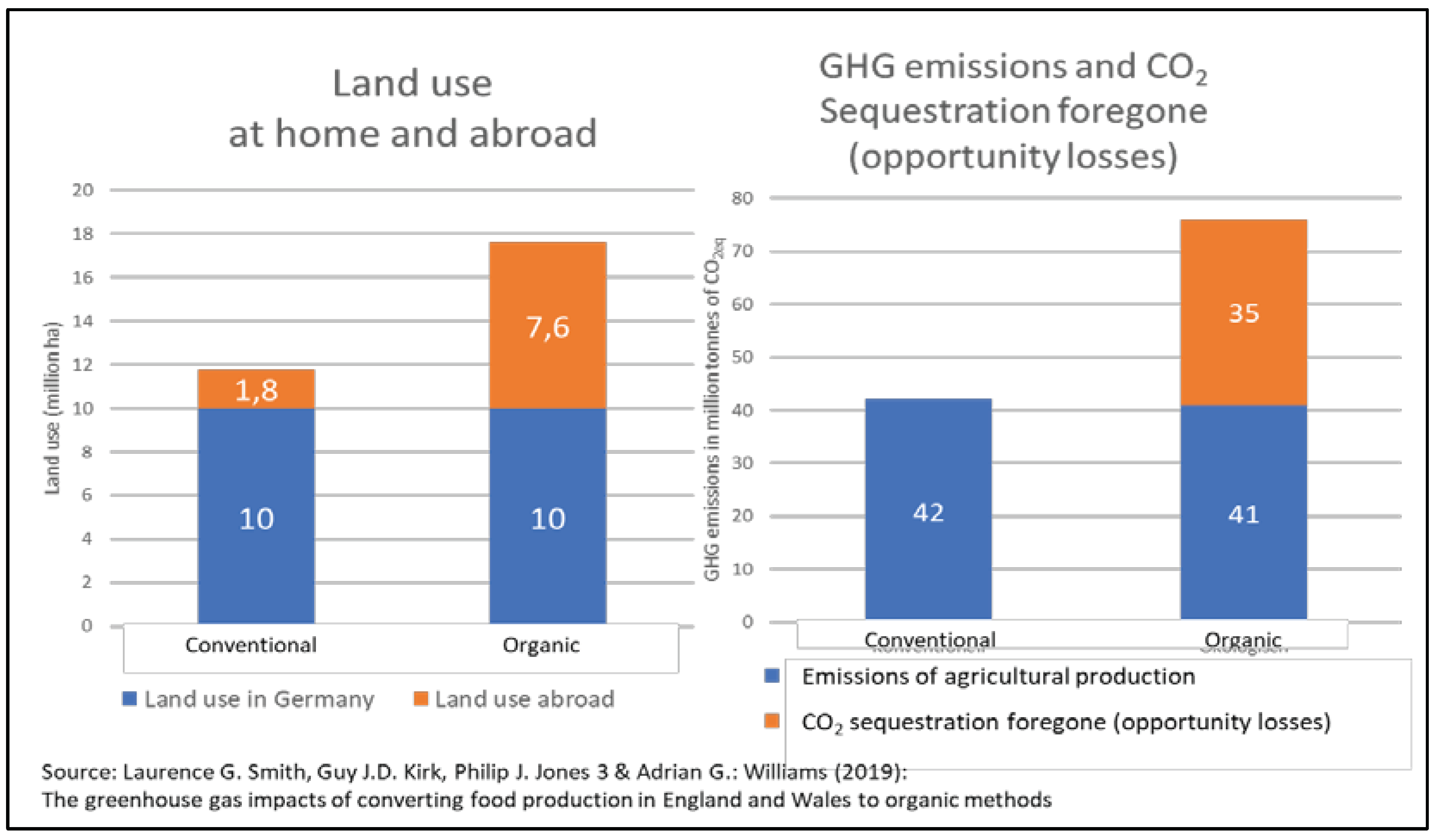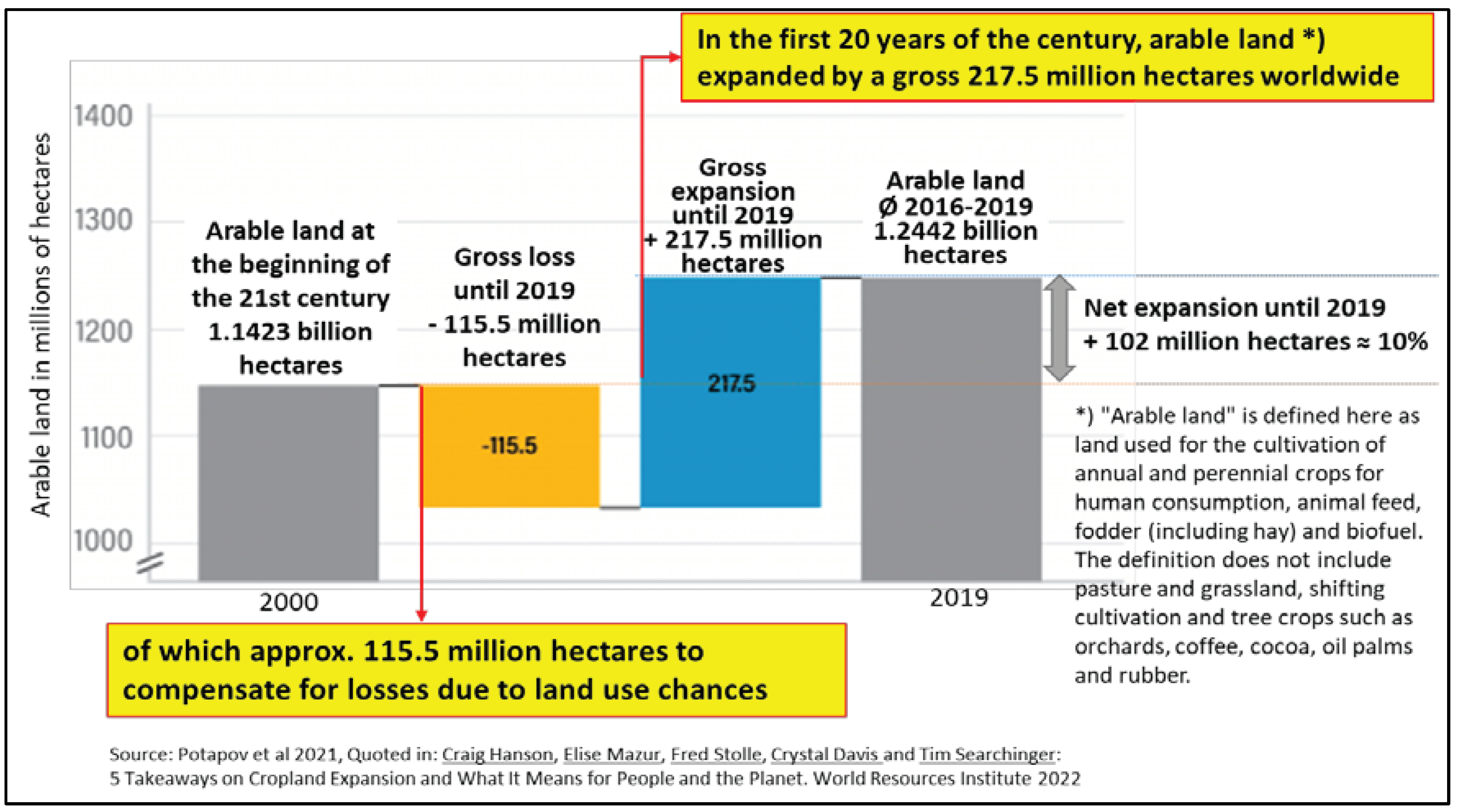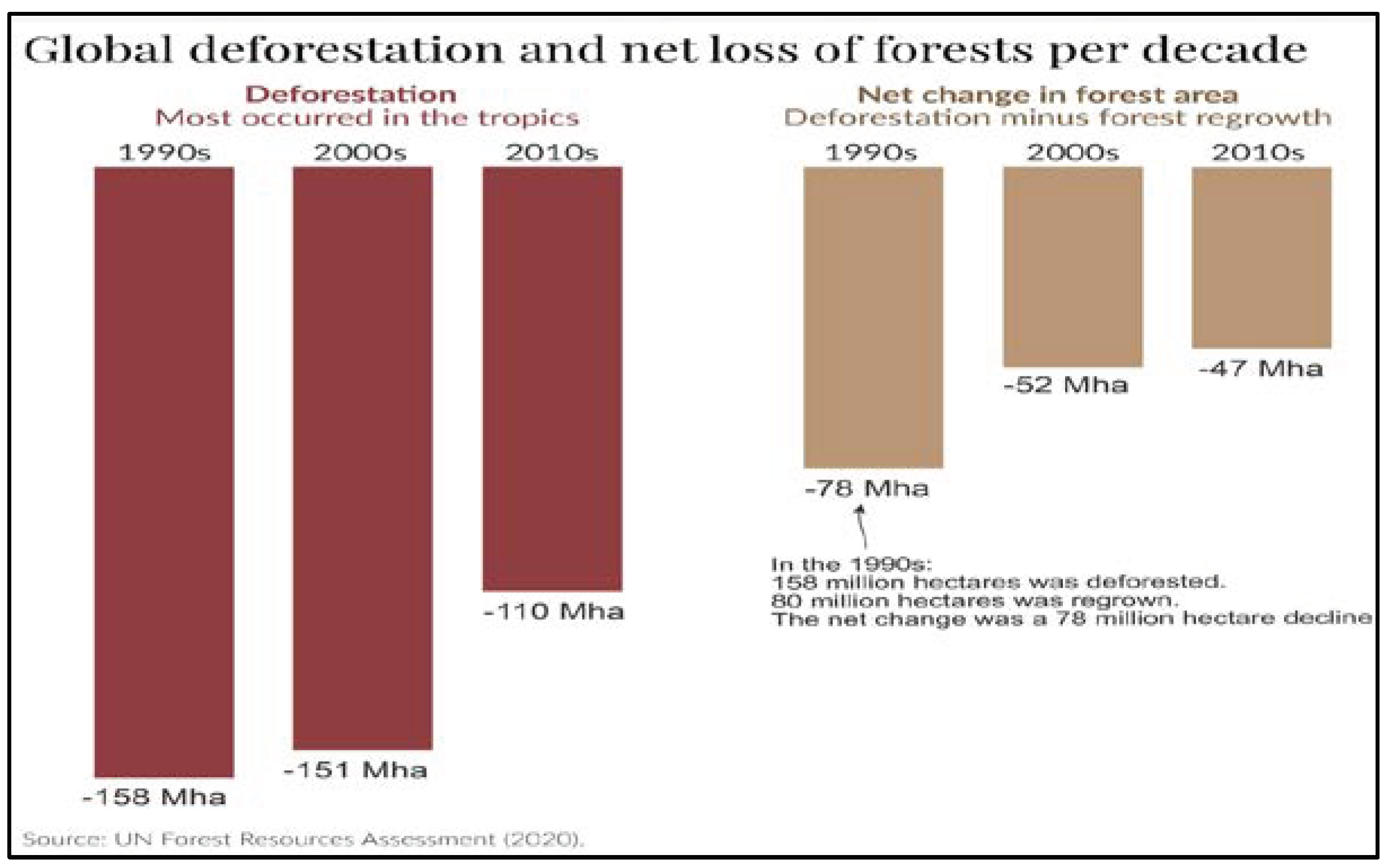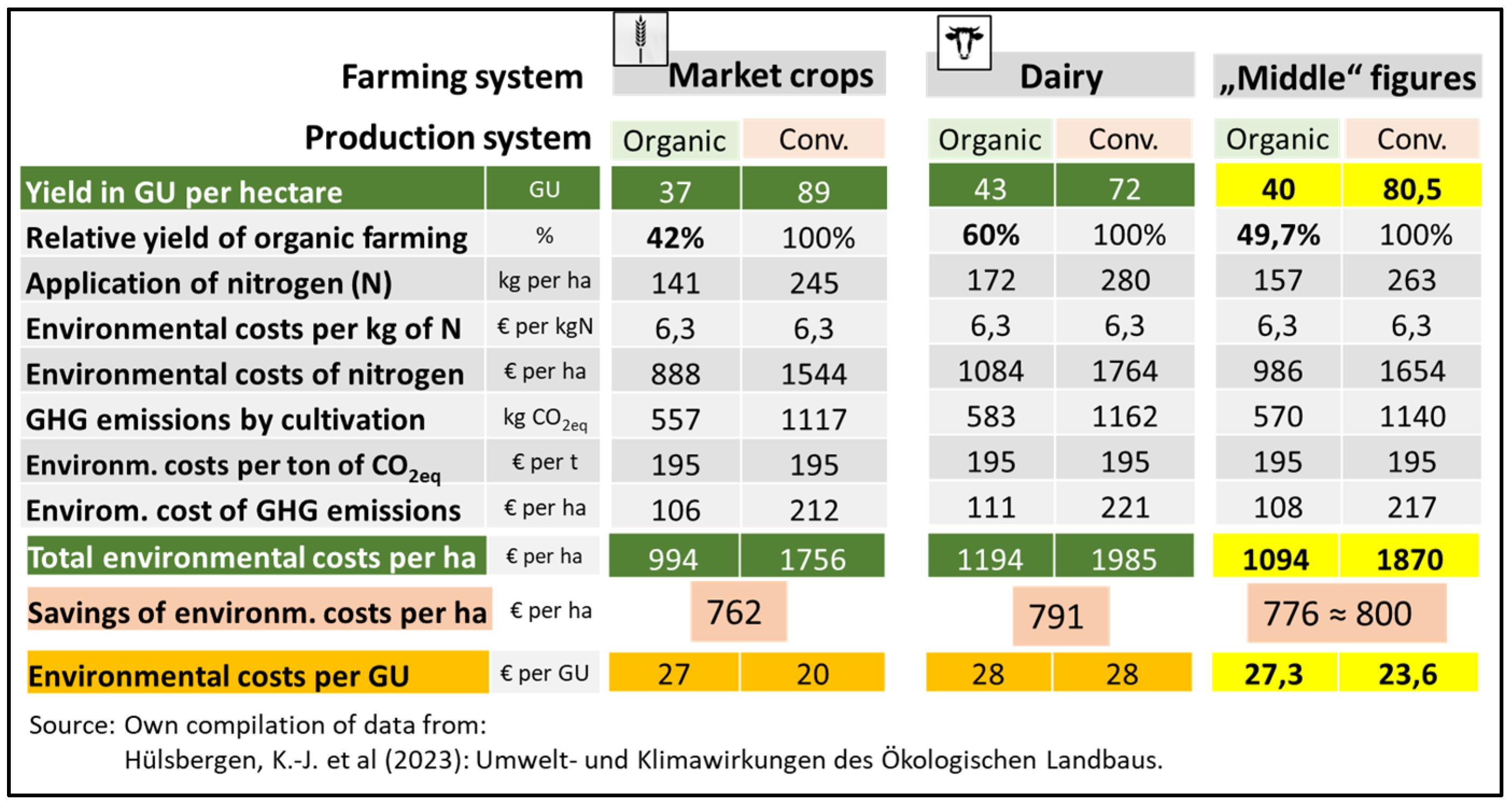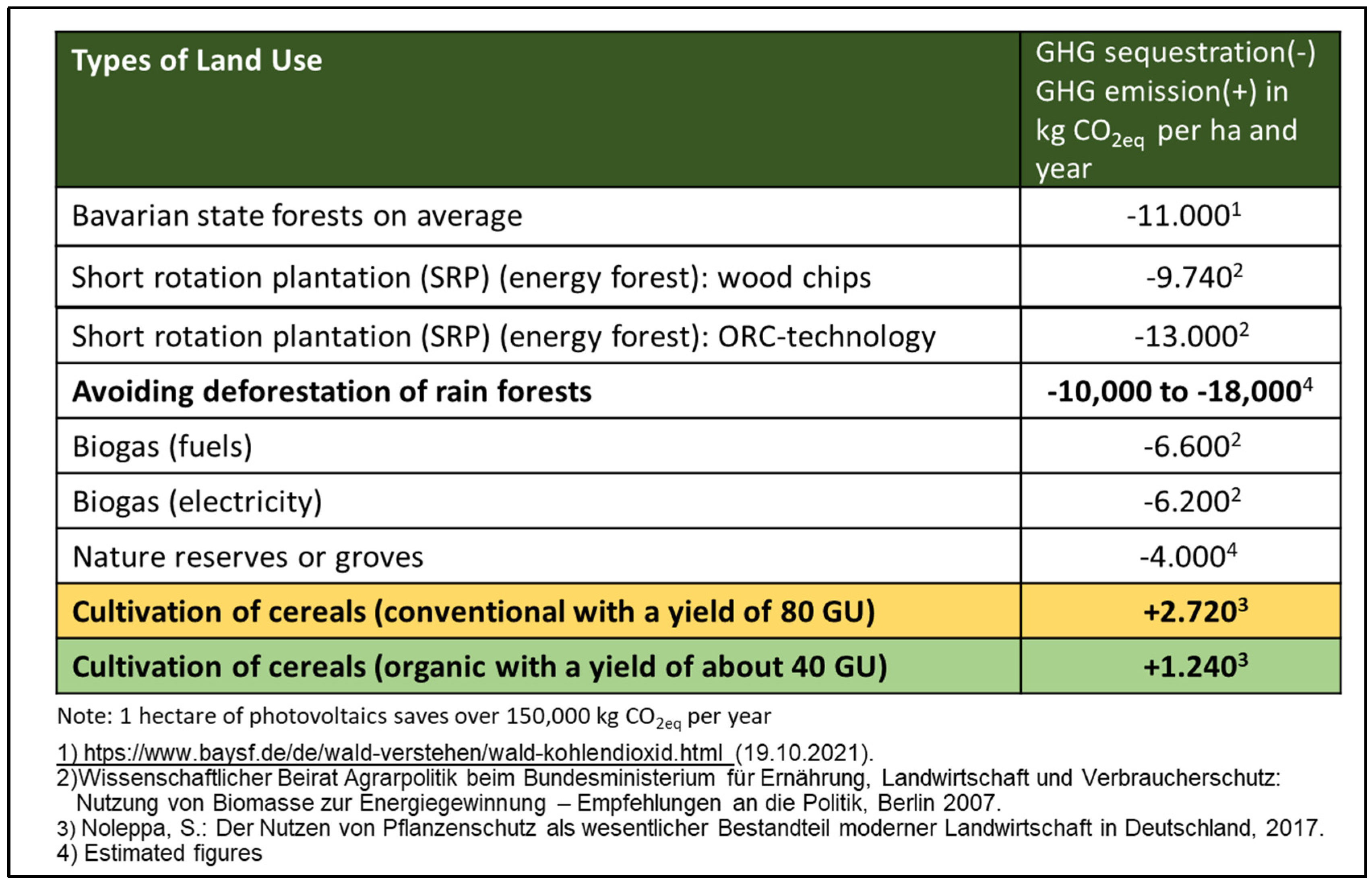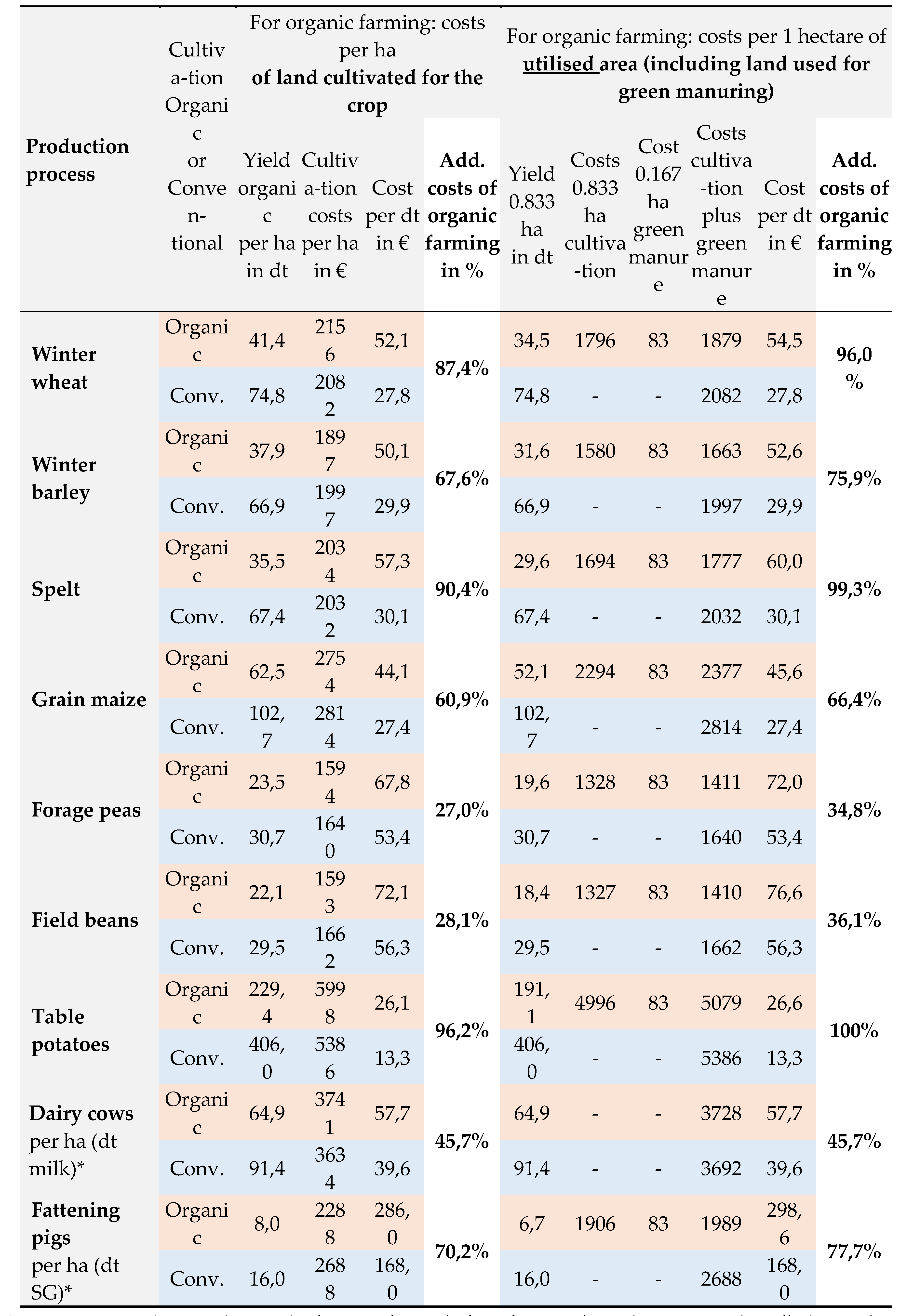1. How Can Responsible Agriculture Be Achieved?
In politics, in society and in agricultural research, organic farming is often seen as the ideal way to meet numerous challenges facing agriculture: to provide sufficient food for a growing world population on a limited amount of available agricultural land, and at the same time to minimise the negative effects of agricultural production on the climate and the environment, without significantly increasing the financial and social costs of food.
However, it is too easy to draw a simple opposition between 'organic' and 'conventional' agriculture. At the heart of the matter the question arises which aspects need to be scientifically evaluated for a solution-oriented approach, and which promising approaches can be identified for the development of sustainable agriculture. To do this, we need to move away from black and white thinking. Analysis and discourse need to be applied accordingly.
A comprehensive analysis in the context of scarce resources leads to the conclusion that a responsible and technologically open development of conventional agriculture, coupled with a moderate reduction in meat consumption, is a more efficient concept for achieving the key objectives of responsible agriculture: to minimise land use, greenhouse gas emissions, biodiversity loss and other negative impacts on the global environment in a sustainable manner, while at the same time providing the world's population with healthy and affordable food and other agricultural goods in a cost-effective and socially responsible way.
What criteria are important for the assessment of responsible agriculture?
The value of land is central to these considerations. The starting point is the fact that, compared with natural vegetation or near-natural use of the same area, growing of crops results in significantly less biodiversity and much higher atmospheric greenhouse gas emissions, irrespective of which system of cultivation is applied. The cultivation of crops suppresses about 70-90% of species and causes a net emission of significant amounts of greenhouse gases through ploughing, sowing, fertilising, pesticides and harvesting, since only about as much greenhouse gas is bound in the biomass during the growth of the crop as is subsequently released by the digestion of food and feed and by rotting in the field. Both the reduction in biodiversity and the increase in greenhouse gas emissions are caused by the production of food and feed, and should therefore be considered as lost benefits, i.e. as opportunity costs or lost opportunities.
The level of these opportunity costs depends largely on the amount of land required for agricultural production. Opportunity costs are lower, the higher the yield per hectare and the lower the amount of land needed to achieve the required production goal. Land needed for production is no longer available for natural vegetation or near-natural use. Comparisons of environmental impacts must therefore include opportunity costs and have to be made in terms of tons of yield rather than per hectares of land. The objective is to produce the required quantity of agricultural goods at the lowest possible environmental cost and thus in an environmentally friendly manner. This is particularly true at a time when the expansion of farmland is threatening natural vegetation worldwide, and when the sequestration and avoidance of greenhouse gases is becoming increasingly important in the face of climate change. Food security and its costs also play an increasingly important role in issues of global justice and security. Relevant criteria include yields per hectare and thus land requirements, impacts on greenhouse gas emissions and biodiversity, as well as production costs and external costs of agricultural production.
Issues such as nitrogen fertilisation, crop protection and food quality also play a role. The type of food (e.g. meat consumption) that people consume to meet their calorie needs also have an impact. Impacts on national self-sufficiency, net agricultural imports and global land-use change are also relevant. Finally, the assessment includes social aspects of the discourse, such as public perception of agricultural systems.
The objective of assessing responsible farming must therefore take all these factors into account.
2. How Do Yields and Area Requirements Differ?
Individual crops in organic farming produce about 40 to 80% of the yield per hectare of conventional crops. However, when crop rotations are compared, the high proportion of low-yielding legumes and the need to grow green manure plants reduces the average yield to around 50%, meaning that organic farming requires twice as much land to produce the same volume. According to statistics from the Agrarmarkt Informationsgesellschaft (AMI), cereal yields on organic farms amount to only 47.4% of those on conventional farms (see
Figure 1).
It should also be noted that in organic farming part of the arable land is used for green manuring, which, together with a minimum of legumes, is necessary to ensure the nutrient supply of the whole crop rotation, in particular by binding atmospheric nitrogen. On average, green manuring crops cover about one sixth of the arable land on organic farms. This means that the area cultivated with winter wheat, for example, is smaller than the area utilised for winter wheat if the area required for green manure crops is included. If one hectare is used for the production of winter wheat, 0.833 hectares are used for its cultivation and 0.167 hectares for green manuring crops. Consequently, the yield figures per hectare of crop have to be adjusted by a factor of 0.833 in order to obtain the yield for the area actually used. The effects of this yield correction are illustrated by some examples in
Table 1. This adjustment is not necessary if the total yields of the holdings in grain units (GU) are divided by the area of the holdings to obtain the average yield per hectare. Green manure crops are then included in the area of each holding.
Grain Unit (GU)1 = unit for calculating the production of a farm or agriculture in an area. The use of the GU makes it possible to summarise individual products into a total value. The animal products are not valued according to their own energy content but according to the energy content of the feed that is required on average for production.
Fodder barley is used as the base unit for the calculation: 1 dt of fodder barley = 1.00 GU. All other plant or animal products are converted into GU according to a fixed key. For example, 1 dt of potatoes = 0.22 GU, 1 dt of rapeseed = 2.46 GU; 1 dt of pork = 3.50 GU, 1 dt of eggs = 2.57 GU, 1 dt of whole milk = 0.86 GU. |
As
Table 1 shows, according to data from the Bavarian State Research Centre for Agriculture (LfL)
2, the yields of organic farming per hectare of land use for all types of cereals and also for table potatoes are mostly below 50% of the yields achieved in conventional farming. Only in the case of legumes, which generally have low yields and are rarely grown in conventional agriculture, the yields achieved in organic farming reach around 60% or more. According to data from Janinhoff
3, organic dairy farming achieves with 71% the highest relative yield per hectare compa red to conventional farming. For pig fattening, on the other hand, the figure is less than 50% if a green manu ring crop is also included in the cost calculation as pig feeds consists almost exclusively of market crops. When interpreting
Table 1, it should also be noted that the LfL data used for organic farming show yields that are around 10% higher than other sources, such as AMI (see
Figure 1, e.g. yields of organic winter wheat and organic spelt).
Table 1.
Comparison of yields from organic and conventional cultivation taking into account the area required for green fallow.
Table 1.
Comparison of yields from organic and conventional cultivation taking into account the area required for green fallow.
| Production process |
Mounting
system |
Yield
in dt per ha
of crop cultivation |
Correction
factor due to
green manuring |
Yield in dt per hectare of utilised area (incl. land used for green manuring) |
Yield of organic farming in % of the yield of conventional farming |
| Winter wheat |
Organic |
41,4 |
0,833 |
34,5 |
46,1% |
| Conv. |
74,8 |
- |
74,8 |
| Winter barley |
Organic |
37,9 |
0,833 |
31,6 |
47,2% |
| Conv. |
66,9 |
- |
66,9 |
| Spelt |
Organic |
35,5 |
0,833 |
29,6 |
43,9% |
| Conv. |
67,4 |
- |
67,4 |
| Grain maize |
Organic |
62,5 |
0,833 |
52,06 |
50,6% |
| Conv. |
102,7 |
- |
102,7 |
| Forage peas |
Organic |
23,5 |
0,833 |
18,8 |
61,2% |
| Conv. |
30,7 |
- |
30,7 |
| Field beans |
Organic |
22,1 |
0,833 |
19,6 |
66,4% |
| Conv. |
29,5 |
- |
29,5 |
| Table potato |
Organic |
229,4 |
0,833 |
191,1 |
47,1% |
| Conv. |
406,0 |
- |
406,0 |
| Dairy cows per ha (dt milk)* |
Organic |
64,6 |
- |
64,9 |
71,0% |
| Conv. |
91,4 |
- |
91,4 |
Fattening pigs
dt SG per ha* |
Organic |
8,0 |
0,833 |
6,7 |
41,9% |
| Conv. |
16,0 |
- |
16,0 |
The results from these three sources clearly show that organic farming achieves only about 50% of the yield per hectare of conventional farming, confirming that twice as much land is needed for organic farming to achieve the same yield.
3. How Does the Higher Land Requirement Affect Greenhouse Gas Emissions?
The additional agricultural land required for organic farming is prevented from a potentially more ecologically valuable use with higher Greenhouse Gas (GHG) sequestration and higher biodiversity (forest, nature conservation). The resulting loss of GHG sequestration and biodiversity is an opportunity cost that must be attributed to organic farming.
Table 3 shows how GHG emissions and GHG sequestration differ for different types of land use, providing examples of opportunity losses.
Organic farming for example emits 1240 kg CO
2eq per hectare per year, while energy forests sequester or avoid up to 13,000 kg CO
2eq per hectare per year. If one additional hectare is needed for arable crops due to organic farming, this one hectare cannot be used e.g. for energy forests and incurs opportunity losses of up to 13,000 kg CO
2eq due to the loss of GHG sequestration, which is not compensated by the only slightly lower emissions of organic farming
5. The amount of the opportunity loss is mainly determined by the type of land use change required to compensate the lower yields of organic farming.
The example calculation including such opportunity losses in
Figure 2, based on Wirsenius (2018)
6, shows how conventional farming can reduce the GHG burden on the atmosphere by 3,880 kg CO
2eq per hectare. If the lower yields of organic farming are compensated by additional imports, the necessary land-use changes take place abroad and often cause significantly higher GHG emissions there, in particular due to the decomposition of large amounts of biomass and the transports required as well as the significantly reduced GHG sequestration due to deforestation.
This applies particularly if the additional imports of agricultural commodities increase deforestation. The GHG emissions or lost GHG sequestration resulting from this land-use change then amount to up to 18,000 kg CO2eq per hectare and more, i.e. very high opportunity costs in terms of GHG emissions.
On the other hand, if the expansion of organic farming in Germany means that land is not used as short rotation plantations (SRF), then the lost opportunity cost of two hectares of organic farming corresponds to the GHG sequestration of one hectare of SRF, which is assumed in
Figure 2 to be 8,000 kg CO
2eq.
The calculation in
Figure 2 shows that one hectare of conventional crop combined with one hectare of SRC results in a GHG avoidance of 7,760 kg CO
2eq compared to two hectares of organic crop with the same total cereal yield. This difference results from the GHG sequestration of one hectare of SRC of 8,000 kg CO
2eq minus the GHG emissions of one hectare of conventional cultivation of 2,720 kg CO
2eq plus the GHG emissions of two hectares of organic cultivation of 2,480 kg CO
2eq. To determine the GHG emissions per hectare which can be avoided by conventional farming, the resulting figure must be divided by two.
As shown in the following formula, this results in a reduction of 3,880 kg CO
2eq per hectare:
The avoidance of 3,880 kg CO2eq per hectare through conventional cultivation clearly shows that omitting the opportunity losses when comparing the cultivation systems, as is still often the case in scientific practice, leads to a highly false-positive assessment of organic farming with regard to its influence on climate change.
4. How Does the Higher Land Requirement Affect Biodiversity?
Biodiversity depends to a large extent on the type of land use. In principle, it can be assumed that natural and semi-natural forms of land use have a higher level of biodiversity than farming. However, there is no reliable indicator that captures the level and complexity of biodiversity in a comparable value for all types of land use. Noleppa
7 gives a simplified estimate that the biodiversity of organic farming is 33% and that of conventional farming is 14% compared to a protected area. For SRP, an estimate of 80% seems plausible. Based on these figures, conventional farming in combination with SRP achieves on average 42% more biodiversity than organic farming (see
Figure 3).
5. How Should Production Costs and Subsidies Be Taken into Account?
Production costs in organic farming are significantly higher than in conventional farming, mainly due to lower yields.
Table 4 shows examples of the cost differences for some important produce. It compares the costs based on the area cultivated for the crop (left) and the area actually used, i.e. including the area required for green manuring (right).
As explained in chapter 1, it is assumed that in organic farming one sixth (0.167) of the arable land is used for green manuring. The full cost of growing green manure is €1,380/ha. As the yields of green manure crops substitute fertiliser, € 885 of these costs are included as fertiliser costs in the cost calculation for the other crops. Therefore, only the remaining costs of €495 per hectare or €83 per 0.167 ha need to be included in the cost calculation in
Table 4. In the case of dairy cattle farming with forage and fodder production, there is generally no need to consider green manuring, as there is manure from the cattle and the fodder crops grown include sufficient legumes.
Figures in
Table 4 show that the impact of green manuring on the production costs is between 5% and 10%. This means that the additional costs of green manuring are less significant than its impact on the yields, which is minus 16.7%. The reason for this is that, although the green manures cause costs and take up land, they also provide fertiliser and thus reduce fertiliser costs.
Table 4 shows that the production costs of organic cereals and potatoes are up to 100% higher than in conven tional farming. Only in the case of legumes, which in any case have moderate yields and are rarely grown conventionally, are organic costs only around 30% higher. For milk production, including the costs of forage and feed, the costs of organic production are 45% higher, and for pig fattening, including feed production, the additional costs amount to 70%. Based on the cost figures presented, it seems plausible to assume an average additional cost of 60-70% for organic farming.
Estimates on this basis suggest that the average production cost in organic farming is around 50 € per GU and in conventional farming around 30 € per GU. These significant cost differences are essential in assessing the preference for either farming system. It is therefore inapprehensible that the significantly different production costs are often not even mentioned in scientific comparisons of the two cultivation systems, such as in the study by Hülsbergen et al.
Here it should also be mentioned, that the additional costs of €20 per GU (€50 instead of €30) for organic products refer only to the financial production costs of farming and do not include the opportunity costs. If these were included, the additional cost of organic produce would amount to €50 instead of € 20 per GU (see
Table 5 below).
Currently, the higher production costs of organic farming are partly offset by additional subsidies. In Germany, in addition to the basic subsidy of around €200 per hectare for all farms, organic farmers receive an additional subsidy of up to €300 per hectare, depending on the federal state in which the farm is located. With a total of up to € 500 per hectare, organic farms receive about 2.5 times higher subsidies per hectare than conventional farms as a full income-supporting direct payment.
Additional payments received for the voluntary application of some of the seven new organic schemes introduced by the EU in 2023 (eco-rules)
8 are not considered. The reason for this is that the payments received for implementing these eco-rules, such as not using synthetic pesticides or practising extensive grassland management, hardly compensate for the costs or yield losses and therefore have no impact on income.
It should also be noted that payments for the implementation of eco-rules are financed by reducing direct income support. This means that farmers indirectly pay for the eco-measures by receiving less direct support.
With 2.5 times the subsidy and half the yield per hectare, organic farming receives five times the subsidy per ton of yield. The higher subsidies thus compensate on average for almost half of the additional production costs of organic farming.
The current practice of subsidising organic farming also encourages the phenomenon of "subsidy optimisation". The proportion of additional costs covered by the organic subsidy varies according to location and production method. The subsidy benefits are relatively high on low yielding arable land, making conversion to organic farming particularly worthwhile. This is even more the case for marginal grassland locations such as Brandenburg. Their production systems are already low in synthetic inputs, so that conversion to organic farming is associated with comparatively small yield losses. Even for dairy farms in some grassland locations, organic farming often results in only 20-30% higher costs. The additional subsidies and the higher price of organic milk therefore make conversion to organic farming particularly lucrative. The different economic advantages are certainly one of the reasons why about 17% of grassland and only 7% of arable land in Germany is farmed organically, and why organic subsidies are generally used selectively.
Despite the additional government subsidies, organic products are considerably more expensive at the retail level, since on top of the higher production costs there are usually much higher trade margins than for conventionally produced products. This hampers the sale of organic products and burdens consumers and the economy with unnecessarily high food costs.
It is also often overlooked that domestic organic produce, with an area share of over 10%, only contribute a volume share of just over 2.5% (as of 2020) to food sales in Germany. In addition to the higher prices, this is due to the high import share of over 40%. The volume share of just over 2.5 % is derived from a monetary arket share of organic products in 2020 of 6.8 %
9, the domestically produced share of around 60 % and an estimated average of 1.6 times higher prices of organic products (6.8 % x 0.6 : 1.6 = 2.55 %).
6. Excursus and Sample Calculation
6.1. Excursus: Comments on the Claim That € 800 per Hectare in Environmental Costs Can be Saved or € 4 Billion When Achieving a 30% or 5 Million Hectare Share of Organic Farming Area
In the study "Umwelt- und Klimawirkungen des ökologischen Landbaus" (2023), Hülsbergen et al. conclude that organic farming saves around €800 per hectare in environmental costs. For the political target of an area share of 30% or 5 million hectares of organic farming in Germany this would result in savings of €4 billion per year (see
Table 2). This figure has been readily taken up by the media as evidence that organic farming is the ideal solution.
However, the study ignores the fact that, as the authors themselves state, organic farming produces only half the yield per hectare (around 40 t/ha instead of 80 t/ha). Expanding organic farming to 30% would, therefore, entail a yield loss of 200 million GU (5 million hectares times 40 GU). Compensation for this yield loss would have to be taken into account in a reliable assessment by deducting both the production and environmental costs of producing the missing 200 million GU from the savings. A calculation for this is given in
Table 5.
If the missing yield from organic farming of 200 million GU is compensated by 2.5 million hectares of conventional farming with a yield of 80 GU per hectare, additional production costs of around €30 per GU and, according to the study, additional environmental costs of €1,870 per hectare of conventional farming are incurred.
In addition, these 2.5 million hectares would not be available for potential alternative uses, such as forests or short rotation plantations, which have much higher GHG sequestration and biodiversity than agricultural use. The resulting losses must be taken into account as opportunity costs. Assuming a loss of GHG sequestration of 8 tonnes per hectare and valuing this according to the study at an environmental price of €195 per tonne CO2eq, this results in a further cost of €1560 per hectare. The additional environmental cost of biodiversity loss is assumed to be €500 per hectare.
Thus, 30% or 5 million hectares of organic farming do not lead to the cost savings of €4 billion calculated in the study by Hülsbergen et al. The methodological and practical necessity of compensating for the lower yields leads to costs of almost €16 billion, so that, after deducting the cost savings, the additional costs for 5 million hectares of organic farming amount to almost €10 billion in total, or almost €2,000 per hectare of organic farming and almost €50 per GU of organic produce. These additional costs include the difference in production costs between the two farming systems.
It is worth noting that if 5 million hectares of conventional farming are replaced by organic, only about half of the previous conventional yield will be organic and the other half will continue to be conventional, requiring an additional 2.5 million hectares of land and 10 billion in additional costs. Compensating for the yield loss through organic production would double the additional land requirement to 5 million hectares and increase the additional costs from around €10 billion to almost €20 billion.
Even if the costs of lost greenhouse gas sequestration and biodiversity are halved, the additional costs of 30% or 5 million hectares of organic farming are still over €7 billion and €14 billion respectively. Consequently, the cost savings of €4 billion calculated in the study are connected with yield losses of 50% or 200 million GE and are therefore methodologically and practically unacceptable.
6.2. Sample Calculation: Comparison of the Effects of Market Crop Cultivation
The impacts of conventional and organic farming can be compared using a simple difference calculation. This involves compiling the main parameters that describe the production of the same amount of yield using the same area of land for each of the two farming systems and highlighting the differences.
Table 5 below shows such a calculation using cereals as an example.
Table 6.
Comparison of the effects of conventional and organic cereal production.
Table 6.
Comparison of the effects of conventional and organic cereal production.
For a yield of 80 GU organic cereal production requires two hectares of land, whereas conventional production needs only one hectare for the same yield, leaving the second hectare available for other purposes. In the example calculation, a short rotation crop (SRC) was chosen to use this second hectare. The choice of land use for the "second hectare" depends on the objective of the calculation. For example, if the expansion of organic farming leads to more imports and expansion of cropland at the expense of rainforest, the parameters for this type of land use change must be used here. If organic farming leads to less protected land, then the data for this type of land use are relevant.
In the example the use of two hectares of land in conventional farming consists of one hectare of cereals and one hectare of SRC and in organic farming both hectares are required for cereals. The total yield is the same in both cases at 80 GE of cereals. In the case of conventional cultivation there is an additional yield in the form of bioenergy with an energy value of 34 MWh.
The cost of producing cereals per hectare in organic farming is roughly the same as in conventional farming. Since two hectares are needed to produce 80 GU of cereals in organic farming instead of one, the cost saved in conventional farming amounts to €2020. The production costs and any subsidies for SRC are not considered, as it is assumed that the revenue, surpasses these costs. The additional economic evaluation of the yield of renewable energy is not included here. It would further increase the disadvantages of organic farming.
As mentioned above, conventional farming receives a subsidy of around €200 per hectare of market crops. Organic farming, on the other hand, receives up to €300 per hectare on top of this subsidy from the respective federal state, giving a total of around €500 per hectare. As organic farming uses two hectares for production, it receives around €1000 in subsidies for the 80 GU, which is five times the amount of state subsidies per GU compared to conventional agriculture. Overall, the higher subsidies cover almost 40% of the additional production costs of organic food crops.
In terms of
GHG emissions for the production of 80 GU, it is assumed that conventional cereal production emits about 2720 kg CO
2eq per hectare, while organic production emits only 2480 kg CO
2eq for the same yield on two hectares
10. However, the higher emissions of conventional crops are more than compensated for by the sequestration of about 8000 kg CO
2eq by SRP, so that conventional grain production together with SRP leads to a GHG sequestration of 5280 kg CO
2eq. Organic farming, on the other hand, requires two hectares to produce 80 GU and emits two times 1240 kg CO
2eq, i.e. a total of 2480 kg CO
2eq. Overall, this means that for the same yield and land use, conventional agriculture burdens the atmosphere with 7760 kg CO
2eq less GHG and is, therefore, far superior to organic agriculture in terms of climate impact.
The picture is similar for biodiversity. Compared to a protected area with 100% biodiversity, conventional farming has a much lower biodiversity of only 14% than organic farming reaching 33%. With the addition of SRC, which is estimated to have 80% biodiversity, the conventional variant achieves an average of 47% compared to 33%, i.e. 42% more biodiversity than organic farming.
Figure 4.
Results of the comparison of parameters of conventional and organic cash crop production.
Figure 4.
Results of the comparison of parameters of conventional and organic cash crop production.
A simplified economic evaluation of the results from
Table 5 arrives at the following additional costs for organic farming of grain crops per hectare:

The result of the example calculation shows that the production of cereals in organic farming incurs €2,366.60 higher production and environmental costs per hectare and €59.15 per GU than in conventional farming. This calculation does not consider the positive effects of the additional energy yield of SRP on domestic energy supply and on the financial and economic performance. If these aspects were taken into account, the costs of expanding organic farming would be even greater. The results clearly show that it was highly irresponsible on the part of the EU and of the German Government to strongly promote organic farming without preceding comprehensive economic and social cost benefit analyses.
The “difference calculation method” is a useful system to clearly visualise and assess the differences between the two types of farming for different scenarios, especially as other criteria can also be taken into account if necessary. The example calculation for the selected scenario shows a very stable superiority of conventional over organic crop production. However, in order to put this result on a broader basis, it is recommended that as many scenarios as possible are analysed using this difference calculation method on the basis of reliable data, e.g. comparing the expansion of organic farming at the expense of nature conservation areas or of rainforest.
7. What is the Role of Agrochemicals and Plant Breeding?
With synthetic fertilisers and pesticides, as well as high-yielding and site-adapted varieties, agrochemicals and plant breeding provide the technologies that enable higher yields and lower land requirements for agricultural production. Assuming that the land not needed is used in an environmentally friendly way, they are therefore the main reasons for the higher GHG sequestration and biodiversity achieved in conventional agriculture. In addition, the use of nitrogen fertilisers brings further benefits in terms of energy and GHG emissions: The extra yield from their use contains many times the energy required to produce and apply the fertiliser, and the extra yield sequesters far more greenhouse gases than are released in the production and application of nitrogen fer tili sers. These effects will be further improved if regenerated ammonia is available in the future. In addition, syn thetic nitrogen fertilisers make it easier to match the nitrogen dose to the crop's needs than is the case with orga nic fertilisers. This often results in lower nitrate leaching per ton of yield in conventional farming (see
Figure 5).
According to a study by ERPS
11 the use of pesticides prevents 30% of global crop losses due to pests and diseases. It would be irresponsible to abandon the use of all these chemicals without equally effective and more environmentally friendly substitutes. The resulting yield losses are likely to lead not only to famines, but also to a massive expansion of arable land at the expense of forests and other ecologically valuable land uses.
It should also be mentioned that organic farming, even with its lower yields, cannot do without pesticides. The quantities used, however, are lower than in conventional farming. But it is by no means the case that the natural substances used in organic farming are less toxic than the synthetic chemicals used in conventional farming.
In fact, copper sulphate, which is considered natural, is many times more toxic than glyphosate (see
Table 7) and would not be approved if the current exclusion criteria for plant protection products were strictly applied. However, it has been approved, since otherwise organic farming would not be possible, particularly in the fruit, wine and hops sectors. For example, a less toxic and less polluting synthetic fungicide such as Tebuconazole could replace copper sulphate if there were no ideological barrier to the use of synthetic products in organic farming.
With regard to pesticides, it should also be noted that the amounts of natural toxins ingested with our food-intake are about 1,500 times
12 higher than the amounts of residues of similar toxicity from plant protection products (
Table 8).
National reporting of pesticide residues analyses about 20,000 product samples each year, of which about a quarter are randomly selected. However, about three quarters of the samples are taken from food products, known to frequently exceed the maximum residue limits.
The method of sampling there fore means that the levels of con tami nation found are not represen ta tive, and the levels of residues in the foods shown are higher than average. Nevertheless, the results can be seen as evidence of the lower levels of contamination in organic products. In organic farming more than two thirds of the samples are free of residues, whereas in conventional farming it is just under one third.
However, in terms of the particularly relevant proportion of samples with complained amounts of residues, the samples of the two farming systems differ only slightly, at 2.25% and 0.45% respectively. This is especially true when considering that these percentages are inflated due to the sample selection methodology. The fact that the actual percentage of contaminated samples from both farming systems is lower is confirmed by the results of the BVL food monitoring programme
13: in 2021, no contamination above the limit values was detected in food of animal origin and only 1.3% of food of plant origin could not be excluded as being harmful to health.
Figure 6.
Results of the national reporting on pesticide residues in food on average for the years 2020 and 2021.
Figure 6.
Results of the national reporting on pesticide residues in food on average for the years 2020 and 2021.
This means that even in conventional products only about 1 to 2% are contaminated with residues above the limit values. In addition, conventional products more often contain extra value-added ingredients and are generally less contaminated with aflatoxins and other mycotoxins, which are not included in the above residue testing. The small difference in harmful contamination is probably the main reason why a number of studies, including the particularly comprehensive Stanford University study
14, have concluded that organic products are not healthier. The slightly higher exposure to pesticides in conventional produce therefore has no effect on health. This means already at present that the lower levels of pesticide residues in organic food do not appear to be a sufficient reason to forgo the considerable benefits of conventional farming, such as lower greenhouse gas emissions and greater biodiversity, as well as lower production costs and greater national security of food supply.
The widespread claim that more organic farming would lead to higher insect populations is also not very plausible. As organic farming expands, the lower yields will require more land to be used for agriculture. This is at the expense of areas of high biodiversity, such as nature reserves and forests, so more organic farming leads to less biodiversity and insects. In addition, rigorous scientific studies have not confirmed the often-claimed sharp decline in insect populations
15. Furthermore, the reduction in the amount, toxicity and persistence of pesticides used since 1970 (see
Figure 7) and the increase in insect mortality, which has only been observed since 2000, suggest that synthetic pesticides are not the main cause of the alleged sharp decline in insect populations. Nevertheless, research into plant protection systems should be intensified to ensure greater safety for humans and the environment. The progress that can be made with synthetic active ingredients is demonstrated by the reductions in toxicity, persistence and application rates that have already been achieved (see
Figure 7). In addition, the potential of biological plant protection, bio-stimulants, robotics and plant breeding must be exploited to a greater extent.
8. Can Yields in Organic Farming Simply be Increased to Reduce the Amount of Land Required?
Low yields in organic farming are mainly due to a lack of plant nutrients. The key factor is a poor nitrogen supply and the difficulty of applying organic fertilisers in a timely manner. This deficiency can partly be reduced by increasing the proportion of nitrogen-absorbing legumes in the crop rotation and by using more organic fertilisers. However, this approach requires a higher area of low yielding legumes and green manures used exclusively for organic fertilisation. This has a negative impact on average yields per hectare. In addition, the untimely application of more organic nitrogen fertiliser can be expected to lead to a comparatively higher nitrate load in groundwater. Also increasing organic fertiliser by increasing forage production and stocking rates will not solve the problem of lacking plant nutrients. However, one possible way to increase yields would be to import more organic fertilisers from the surpluses available on conventional farms. Although some organic labels allow limited nutrient imports, most organic associations prohibit them.
Yield increases through plant breeding are certainly possible, but require a lot of time due to the fundamental rejection of modern and rapid breeding methods in organic farming. In addition, the limiting factor of available plant nutrients is likely to reduce breeding success in organic farming primarily to increasing yields through greater yield security such as increased drought tolerance and greater resistance to diseases and pests.
Advances in crop protection through biological methods, robotics and bio-stimulants are likely to be of less absolute benefit to organic farming than to conventional farming due to lower yields. In the long term, organic farming is even likely to lead to declining yields due to the often deficient nutrient balance. This is confirmed, for example, by Kirchmann et al. with data on yield trends in Sweden
16.
9. Can Reduced Meat Consumption Make Organic Farming a Solution?
In principle, a multiple of feed calories is required to produce one food calorie in an animal produce such as milk or meat. The number of feed calories required per calorie of animal produce varies depending on the type of animal (cattle, pigs or chickens), the type of produce, the feeding intensity and the performance of the animals, measured for example as daily weight gain or milk yield per year. The amount of feed calories required per calorie of animal product can be expressed by a refining factor. The average refining factor is about 6 to 7:1.
It should be noted that animals, especially ruminants such as cattle, sheep and goats, have the ability to convert biomass indigestible to humans into animal produce of high nutritional value. Livestock production, and consequently the consumption of animal products, is therefore necessary to enable the use of indigestible plant resources for human nutrition. For example, Germany has more than 4.7 million hectares of grassland that can only be used for food production through livestock farming. In addition, large amounts of non-digestible biomass are left-over products of food processing, especially also in the production of vegan food, so that a minimum consumption of animal products is necessary in order to utilise this biomass. It remains to be seen to what extent bioreactors will also be able to convert non-digestible biomass into digestible biomass in the future. Their higher conversion efficiency would reduce the amount of land required. However, the processes known to date use a high proportion of biomass that is digestible by humans, which reduces their environmental impact. In addition, there is a question mark over the extent to which consumers will be willing to pay for this kind of 'artificial meat'.
Reducing the consumption of animal calories is of high environmental benefits if the reduction frees-up feed calories that can be used for human consumption. This is particularly true for reduced consumption of pork and poultry meat. Both species are fed almost entirely with feed that can also be used for human consumption.
In Europe and the US, well over 50% of animal food is produced with feed that competes directly or indirectly (via the arable land used) with human food. Since on average six to seven times more plant calories are required to produce one calorie of meat, it is often argued that the higher land requirements of organic farming could be offset by a substantial reduction in the consumption of animal products and an increase in the direct consumption of plant foods.
Figure 8 shows that a reduction of 50% in the consumption of animal products, e.g. from 1100 kcal to 550 kcal per day, reduces the requirement for primary calories (i.e. those of plant origin) from 8800 to 6050 per day, i.e. by about 30%.
If the reduced primary calorie requirement is met by conventional farming, land use and GHG emissions are also decreased by 30%, whereas if the remaining calorie requirement is met by organic farming, land use increases to 140% due to half the yield and leads to 20% more GHG emissions than in the baseline situation (
Figure 9).
Reductions in animal-based foods only lead to significant climate and biodiversity benefits when combined with high-yield agriculture.
Figure 9 shows that a 50% reduction in animal-based products combined with organic farming results in 71% more GHG emissions than when combined with conventional farming.
However, when reducing the consumption of animal products, it is important to note that, for physiological reasons, the amounts of animal protein should cover a minimum requirement and that large amounts can be expected to be harmful to health. However, there are very different opinions on the levels of these quantities. From an agricultural point of view, a rate of around 40-50% of the current consumption of animal products can be seen as sufficient to utilise the non-digestible and waste biomass available.
It is also likely that global consumption of animal-based foods will continue to grow by at least one per cent per year and, unless the potential for efficiency gains in animal production is sufficiently utilised in many countries, will contribute to a further sharp increase in the amount of land required for agricultural production.
10. Why Is It so Important to Also Consider the "Virtual Import of Land"?
Germany's net imports of agricultural goods are equivalent to the yield of almost seven million hectares of agricultural land in the countries of origin of the imports (see
Figure 10). This means that on a net basis, i.e. after deducting exports, Germany "virtually" imports almost 40% of the agricultural land available within the country to meet its own demand on agricultural goods. Just to cover Germany's food consumption needs, the net imports required correspond to the yields of around five million hectares abroad.
According to the Statistical Yearbook 2019/20 Germany is 88% self-sufficient in food. However, this includes 8% of animal food produced from imported animal feed. Due to refining losses in the production of these 8% animal calories, the import requirement for feed calories is about five to six times higher than these 8% and contributes significantly to the high virtual net import of agricultural land.
A very worrying fact is that this virtual land import has increased by almost one million hectares between 2010 and 2017, suggesting that self-sufficiency in food supply is indeed declining at a disturbing rate. In a world of increasingly frequent crises and declining yields in general due to climate change, this growing dependence of Germany's food supply on foreign countries poses a considerable risk, which is further enhanced by the expansion of organic farming due to its higher land requirements.
In addition, these high imports put pressure on international markets, increase global hunger through rising food prices on the world markets, and increase not only greenhouse gas emissions through additional land use changes, but also the loss of biodiversity. To be responsible and sustainable, Germany and also the EU must not act at the expense of others.
The fact that expanding organic farming leads to more virtual land imports and more GHG emissions is confirmed by a detailed study of the conversion to organic farming in England and Wales
17. According to this study, a full transition to organic farming in these two countries would increase virtual land imports from 1.8 to 7.6 million hectares and GHG emissions by more than 80% from 42 million tons to 76 million tons of CO
2eq, when taking into account lost opportunities (see
Figure 11).
11. Can Virtual Land Imports be Reduced through Lower Meat Consumption?
By reducing the consumption of animal products by 50%, conventional agriculture in Germany could not only completely cover the net domestic food demand and thus eliminate net imports, but also free up 1.3 million hectares for more ecologically valuable uses such as nature conservation or bioenergy. If the same reduction in animal-based food were achieved in conjunction with a complete shift to organic farming, 10 million hectares more would be needed for agricultural production. This means that not only would no land be released for nature conservation or bioenergy, but some 8.7 million hectares would have to be virtually imported. A transition to organic farming without a reduction in the consumption of animal produce would even increase Germany's land imports to almost 20 million hectares.
18
12. Why Is the Expansion of Agricultural Land a GLOBAL problem?
Between 2000 and 2018, the gross area of arable land worldwide increased by about 217.5 million hectares at the expense of forests, grasslands, natural vegetation and drylands (see
Figure 12).
Part of the expansion served to compensate for the abandonment or conversion of some 60 million hectares of arable land into grassland and fallow land and almost 20 million hectares into settlement and infrastructure areas. However, about 35 million hectares of the gross loss were afforested or put to another ecologically valuable use, so that 'only' about 180 million hectares of the gross expansion of 217.5 million hectares were actually at the expense of ecologically more valuable areas.
Since this total does not include the expansion of tree crops such as fruit plantations, coffee, cocoa, oil palm and rubber, the actual loss of ecologically valuable land per year exceeds the 10 million hectare and is likely to be more than 1% of global arable land per year.
A particularly serious fact is that the high losses of tropical rainforests having declined for three decades (see
Figure 13) have been increasing again from 2020 onwards. With net losses of around five million hectares of forest per year, large areas of particularly species-rich and greenhouse gas-absorbing ecosystems are being permanently destroyed. The part of the loss that regrows, for example after harvesting of wood or shifting cultivation, also cause considerable damages as large quantities of biomass decompose and it takes decades for the forest to return to its original state.
Since the expansion of arable land is highly detrimental to the climate and biodiversity, it is therefore essential to decouple agricultural production from the conversion of valuable ecosystems. To achieve this, existing arable land must be used as efficiently as possible. Organic farming with its low yields increases the amount of land needed and, if it continues to expand, will be a key contributor to deforestation, accelerating climate change and damaging biodiversity. Consequently, it is absurd that representatives of the German government and many environmental organisations, such as Greenpeace, BUND and WWF, complain about the loss of global forest cover while at the same time vehemently advocate the expansion of organic farming.
13. Why Is the National Greenhouse Gas Balance Misleading with Regard to Organic Farming?
In the national greenhouse gas balance domestic greenhouse gas emissions are only recorded. These are more than 50% lower per hectare in organic farming than in conventional farming. However, yields are also about 50% lower, so that when organic farming is expanded, the lower yields often have to be compensated by additional imports. The agricultural goods produced abroad to compensate the lower yields cause additional greenhouse gas emissions due to cultivation, lost opportunities and transport. These are much higher than the emissions saved domestically by organic farming, but are not recorded in the system of national greenhouse gas statistics.
The expansion of organic farming therefore leads to a reduction in greenhouse gas emissions in national statistics, and thus helps the German government to meet its international climate commitments. On a global scale, however, the situation is reversed. For this reason, national emissions statistics are unsuitable as a basis for responsible government action. It would be useful to have a database that includes all greenhouse gas emissions from domestically consumed agricultural goods, including imported goods. Then, in the interests of climate protection, it would not be "organic" that should be promoted, but sustainable cultivation with high land productivity within Germany.
14. How Does Society View Organic Farming?
The perception of organic farming is generally very positive. Many believe that near-natural production is automatically good for health, climate and environment. Consumers rarely question this simple narrative, especially as parts of the scientific community confirm the positive assessment of 'organic' and often ignore the negative aspects. Many media outlets also lack their usual critical stance on this issue.
In food retailing, the much higher retail margins (e.g. €18.40 for a kilo of organic chicken breast compared to €2.73 for conventional, or 41 cents instead of 24 cents for a kilo of potatoes
20) also encourage the promotion of organic products. The fact that the high trade margins are enforceable indicates an overestimation of organic quality and a lack of consumer information about the real facts.
It is positive that today many people want to support environmental and climate protection and global justice, but at the same time all the more regrettable that more differentiated and comprehensive arguments and information are not provided to promote truly responsible behaviour.
15. What Is the Role of Agricultural Research Today?
The overall impression is that large parts of German agricultural research take a positive view of organic farming. This view is perfectly understandable if its effects are solely related to the area under organic cultivation. However, given the significantly lower yields per hectare and the average 60-70% higher production costs, this assessment changes fundamentally when one considers that we live in a world with limited arable land, high and rapidly growing food demand and low incomes for large parts of the population. Low yields and high prices threaten food security, burden poor populations with high food prices and lead to deforestation.
Even reputable scientific institutions base the alleged superiority of organic farming primarily on a comparison of environmental impacts per hectare rather than per ton of yield, which would be the relevant figure for minimising the environmental costs of meeting demand.
Even more seriously, the scientific case for expanding organic farming is often made without considering the higher land requirements and the associated loss of opportunities in terms of greenhouse gas sequestration and biodiversity. In addition, the 60-70% higher production costs of organic products and the resulting social and economic consequences are rarely discussed. A likely link between the increasing expansion of organic farming and deforestation is also largely overlooked. Furthermore, the impact of synthetic fertilisers and pesticides on food and the environment is mostly seen as negative and is widely exaggerated; robust scientific studies on the subject are often ignored
21.
Such a one-sided judgement is also illustrated by the study by Hülsbergen et al., whose main shortcomings are briefly explained in the above excursus. Such an approach is difficult to reconcile with scientific standards. But this is not an isolated case. Studies seem to be conducted in the interest of a desired result and the impression of a "result-oriented study design" cannot always be ignored.
In addition, very low levels of pesticide residues, well below limit values, are sometimes used to launch highly exaggerated and misleading media campaigns. Such exaggerations are then used as evidence of the environmental concern of the publishing institution. However, the frequent combination of such campaigns with appeals for donations raise doubts as to the real interests of those promoting the ban of pesticides.
16. Summary
A responsible and technologically open development of conventional agriculture together with a moderate reduction in meat consumption is the more efficient future model for a sustainable and responsible agriculture.
Due to its high land requirements organic farming causes significantly higher production costs, far more greenhouse gas emissions and higher biodiversity losses than conventional agriculture; more organic farming is therefore not an appropriate strategy for the future of agriculture.
Technologies need to be assessed comprehensively; simple per-hectare comparisons are inadequate and incorrect; production and opportunity costs also need to be taken into account.
For the development of agriculture, the technologies of all forms of farming should not be seen as opposites, but as a spectrum from which the best can be selected.
The media should be more critical of statements and research results on farming systems before publishing them, and should also face up to the highly complex interrelationships.
High and area based subsidies for organic farming combined with high food prices are inefficient and economically and socially highly questionable instruments to support sustainable agriculture.
Reduced consumption of food of animal origin cannot compensate for the higher land requirements of organic farming and only has a significant positive effect on climate and biodiversity in combination with high-yield agriculture.
A more intelligent support policy must provide lucrative incentives for goal-oriented behaviour and not be based on ecological improvements at the expense of farmers' incomes.
17. Appeal for a Sustainably Intensive Agriculture
The Goal: Conservation, Justice, Technology - a Model for Responsible Agriculture
We need to view land use as a central factor and manage it consciously. Responsible land use is the way in which the best economic and social use of the resource of land can be made - back to the core of the word agriculture. In terms of yield, production costs and land requirements, organic farming performs significantly worse than conventional farming. However, if this potential is to be realised, the idea of freeing up land for the benefit of climate protection and biodiversity must be consistently supported by society and politicians.
In the interests of global justice, the “import of land” must also be considered. Climate change, soil degradation and the limiting factor of usable land make it imperative to conserve and possibly even expand ecologically valuable areas for climate and biodiversity and to promote the productive use of available arable land to feed the world's population.
All technological possibilities must be employed to this end, and the undesirable developments of the past must be avoided through incentives and regulatory policies. The findings of organic farming must also be explicitly used to achieve a greening of agriculture as a whole.
18. The Starting Point: Addressing the Entire Agricultural Sector
As a starting point conventional agriculture offers significant advantages. Conventional agriculture is not only the dominant form of land use, still producing well over 90% of agricultural commodities, but it is also largely practised by highly skilled and responsible farmers, who are open and capable of responsibly implementing all those technologies which improve climate, environment, biodiversity, yields and profitability. It is the task of policy-makers to set the framework conditions according to eco-social criteria in such a way that all available technologies are used and further developed to create an innovative, environmentally friendly, sustainable and profitable agriculture. The objective must be to create an efficient, cost-effective and environmentally responsible agricultural sector.
18.1. The Path: Creating The Right Framework Conditions
18.2. Equal Subsidies for Organic and Conventional Agriculture
The evidence of lower biodiversity and higher greenhouse gas emissions in organic farming compared to conventional farming shows that external costs increase rather than decrease with the expansion of organic farming. This undermines a key argument for the special support for organic farming practised at present. In addition, area-based support leads to windfall gains and inefficient financing. The disproportionately high level of public support for organic farming is therefore not justifiable - it should be put on an equal footing with the rest of agriculture. At the same time, the political target of 30% organic farming in Germany and 25% in the EU is demystified, as it leads to the undesirable effects mentioned. Without special subsidies the volume of organic farming would only be determined by those consumers prepared to pay higher prices for a purely subjective added value. The deliberate misleading of consumers in the interest of high sales volumes and the enforcement of high trade margins for organic products should be specifically counteracted.
18.2.1. Approval of Crop Protection Products Based Solely on Environmental Criteria
The approval of plant protection products should be strictly based on toxicity and impact on flora, fauna and food quality. Exceptions, such as the highly toxic copper compounds required for organic farming, should be avoided. Over time, increasingly stringent approval and application criteria would make it possible to reduce negative effects without significant yield losses. An application cut of pesticides by half or even more does not make sense for several reasons. Rigorous scientific studies show that the negative effects of chemical pesticides on flora, fauna and food quality are much smaller than is generally assumed. In particular, they are too small to justify the higher production costs of organic farming and the associated lower yields, as well as the negative environmental impacts of additional land use and relocation of production abroad.
18.2.2. Targeted Promotion of Measures with Positive Environmental Impacts for All Farms
Improving the environmental performance of agriculture as a whole can be achieved in a more targeted and effective way by promoting measures with concrete, verifiable effects than the current area-based support for organic farming. For example, activities rewarded with zone-specific eco-points would be applicable to all farms and thus allow for targeted improvements across the board. To achieve this, the rules should be designed to ensure that payments only encourage substantial and sustainable positive environmental impacts and provide real income incentives. For effective implementation, the instrument should follow the following principles:
Strictly focus support on effectiveness - preferably improving the environment without reducing yields: Effective measures include the use of environmentally friendly and yield-enhancing inputs, such as regeneratively produced nitrogen and more environmentally friendly pesticides, as well as multiple crop rotations and increased humus formation. Particularly in the case of yield-reducing measures care must be taken to ensure that opportunity costs are also taken into account.
Make environmental measures economically attractive: Subsidy amounts should be set at about half of the costs or yield losses of the measures in order to achieve an income effect of at least one third or at least one quarter of the subsidy amount. If the take-up is too high, adjustments can be made by reducing the income-increasing part or by setting upper limits.
Compensation of additional costs from public funds: The costs associated with the environmental measures should be covered by reallocating the existing support for organic farming and, if necessary, by additional state funding. Only the income-increasing part of the support should come from the reallocation of former income-increasing payments, so that the measures do not reduce farmers' incomes.
Incorporate existing eco-regulations: Where existing eco-labels are in line with the principles of the new scheme, they should be adapted and adopted; the others should be repealed.
Reducing premium skimming by landowners: The subsidy organised in this way would also be financially attractive to tenants and would counteract premium skimming by landowners.
Targeted support for specific farm types: Differentiated support for ecological services according to farm type would make it possible to give preferential support to particularly eligible farm types, for example in certain size classes or in disadvantaged areas.
18.3. De-Bureaucratisation of Agricultural Subsidy System
Farmers are burdened by excessive bureaucracy and often overly detailed, impractical and sometimes contradictory regulations. Too many incomprehensible forms, inadequate and sometimes unprofessional digitisation, and in some cases divided responsibilities between authorities have also been criticised for complicating procedures and having a negative impact on farming. A growing number of farmers are even foregoing support, because the amounts paid are not worth the effort and risks involved.
22 The fact that many hours of skilled personnel are tied up in unproductive or even counterproductive bureaucracy and the resulting financial and economic costs should not be overlooked.
The following principles, for example, should be followed when reducing bureaucracy:
Fewer detailed rules and more decisions in the hands of farmers, who are well trained and interested in environmentally friendly farming practices that maintain and improve the natural production base of their farms. After all, they are the first to be affected by any damage to flora and fauna.
Reducing the number of support measures and simplifying documentation requirements to the minimum necessary, and eliminating minor controls altogether.
Harmonising the rules of different authorities and reducing responsibilities to as few offices as possible.
Requiring public authorities to provide timely, written and legally binding information on specifications and supporting measures in response to specific written requests. To reduce misinformation and high staff costs, a legally binding information system on 'artificial intelligence' should be pursued.
Collecting innovative ideas for bureaucracy reduction centrally and encouraging all stakeholders, from science to ministries, offices and farmers, to make proposals for bureaucracy reduction, for example by awarding incentives. Setting up advisory boards at the level of the ministries, representing all those involved, would also help here.
18.4. Promotion of a Broad and Critical Discourse in Professional Circles and Society
German and EU agricultural policy decisions are currently strongly influenced by selected studies, such as the Thünen Report 65
23 and the Zukunftsstudie Landwirtschaft
24, which give a very favourable assessment of organic farming. This positive assessment is mainly due to the fact that the environmental benefits of organic farming compared to conventional farming are mainly considered on a per hectare basis. Environmental impacts per unit of volume and production costs play only a minor role. In addition, the opportunity costs of organic farming due to higher land requirements are largely ignored. Recommendations are therefore not always based on a sufficiently broad consideration of the relevant factors and impacts that are crucial for a responsible agriculture.
It is, therefore, time to consider how to reopen the way for broad, critical and open-minded discussion and reporting in the media on the politically and emotionally charged issues of organic farming and the greening of agriculture. The current one-sidedness not only prevents real discourse and consequently rational decisions but is also detrimental to environmental sustainability, global justice and ultimately social and economic prosperity. It is highly surprising that there are only a few active German agricultural researchers who publicly criticise the methodologically narrow research approaches. It is also remarkable that the few German critics and the many international publications critical of organic farming, for example by British, Swedish or American authors, are scarcely recognised in the academic exchange of views in the media and in the social and political debate. This hinders a rational and goal-oriented debate for a responsible and future-oriented agricultural policy.
The use of yield-enhancing technologies to save agricultural land in favour of more environmentally friendly forms of land use needs to be brought back to the forefront of the debate. High yields are needed to preserve the world's forests and grasslands and thus limit climate change, species loss and freshwater shortages on our planet to tolerable levels. Nobel laureate Norman Borlaug and Christopher Dowswell summed up this simple insight at the end of the last century, recognising the value of high yields when they wrote: "
Growing less food per acre means leaving less land for nature25". With today's knowledge there are also high demands on the yield-enhancing inputs themselves in terms of their impact on the environment and this aspect must be at the centre of the debate, alongside yield increase and effic5555555iency in the use of these inputs. In any case, the use of all yield-increasing and land-saving fertilisers and pesticides, as well as modern plant breeding combined with a strong commitment to minimising harmful effects on the environment, is a better solution than the rejection of the highly effective and efficient synthetic substances, as propagated by organic farming.
Nevertheless, it is to the credit of organic farming that it has raised awareness for ecological problems in conventional agriculture. This was particularly the case in the late 1980s, when income subsidies through high produce prices made it highly attractive for agriculture to use large amounts of chemical inputs, leading to excessive use of pesticides, over-fertilisation and one-sided crop rotation. Organic practices have contributed to improved technologies, particularly in fertilisation, soil preparation and crop protection. As a result, it has brought about timely corrections and thus limited environmental damage. This shows that organic farming is valuable in terms of a technology-open optimisation of agriculture as a whole, and that the knowledge gained from this form of land use must be part of this rational approach to sustainable, intensive agriculture. The responsible ecological reorganisation of our agriculture must be carried out in such a way that its productivity and efficiency are maintained and, as far as possible, increased.
References
- Fernandez-Cornejo, Jorge, Richard Nehring, Craig Osteen, Seth Wechsler, Andrew Martin, and Alex Vialou. Pesticide Use in U.S. Agriculture: 21 Selected Crops, 1960-2008, EIB-124, U.S. Department of Agriculture, Economic Research Service, May 2014 zitiert in Phillips McDougall, 2018; Evolution of the Crop protection Industry since 1960. 20 May 2018.
- Hülsbergen, K.-J., H. Schmid, L. Chmelikova, G. Rahmann, H. M. Paulsen, U. Köpke (2023): Umwelt- und Klimawirkungen des ökologischen Landbaus. Weihenstephaner Schriften Ökologischer Landbau und Pflanzenbausysteme, Verlag Dr. Köster, Berlin.
- Janinhoff, Alfons (2023): Agrardaten-Analysen nach Buchführungsergebnissen, http://agrardaten-analysende/13591/1. 1359.
- Kirchmann, H. , Bergström L., Kätterer, T., und Andersson, R. (2016): Dreams of Organic Farming – Facts and Myths, Stockholm. https://pub.epsilon.slu.se/13967/7/kirchmann_h_et_al_170125.pdf.
- Laurence, G. Smith, Guy J.D. Kirk, Philip J. Jones and Adrian G. Williams (2019): "The greenhouse gas impacts of converting food production in England and Wales to organic methods", Nature Communications volume 10.
- Noleppa, S. (2017): Der Nutzen von Pflanzenschutz als wesentlicher Bestandteil moderner Landwirtschaft in Deutschland, Industrieverband Agrar - https://www.iva.de/publikationen/der-nutzen-vonpflanzenschutz.
- Potapov et al 2021, Zitiert in: Craig Hanson, Elise Mazur, Fred Stolle, Crystal Davis and Tim Searchinger: 5 Takeaways on Cropland Expansion and What It Means for People and the Planet. World Resources Institute 2022.
- Sanders, Jürn, Jürgen Heß (Hrsg.) (2019): Thünen Report 65, „Leistungen des ökologischen Landbaus für Umwelt und Gesellschaft“. 2. überarbeitete und ergänzte Auflage. https://www.thuenen.de/media/publikationen/thuenen-report/Thuenen_Report_65.pdf.
- Smith-Spangler, C; et al. (Stanford University): Are organic foods safer or healthier than conventional alternatives? A systematic review. Annals of Internal Medicine 2012, 157, 348–366. [Google Scholar] [CrossRef] [PubMed]
- Smith, L.G. , Kirk, G.J.D., Jones, P.J. et al. (2018): The greenhouse gas impacts of converting food production in England and Wales to organic methods. Nat Commun 2019, 10, 4641. [Google Scholar] [CrossRef]
- Ritchie, Hannah (2021) - “Deforestation and Forest Loss” Published online at OurWorldInData.org. Retrieved from: 'https://ourworldindata.org/deforestation’.
- Ströbel, Herbert (2022) Jenseits der Ökoillusion – Gedanken zu einer nachhaltigen Landwirtschaft. https://www.herbert-stroebel.info/.
- Tiedemann, Andreas von (2023): Pflanzenschutzreduktion - Begründungen, Alternativen, Folgen, 20. Pflanzenbau-Fachtagung, LWK Niedersachsen, Hannover, 24.02. 2023.
- Taube, Friedhelm et al. (2005): Vergleich des ökologischen und konventionellen Ackerbaus im Hinblick auf Leistungen und ökologische Effekte auf Hochertragsstandorten Norddeutschlands (Projekt CONBALE), "Berichte über Landwirtschaft" Heft 2, August 2005.
- Wirsenius, Stefan (2018): Organic Food Worse for the Climate? Department of Space, Earth and Environment, Chalmers University of Technology, Göteborg. ScienceDaily. www.sciencedaily.com/releases/2018/12/181213101308.htm.
- Zuna-Kratky, T. et al. (2023): Veränderung von Insektenpopulationen in Österreich in den letzten 30 Jahren – Ursachen und ausgewählte Beispiele; van Klink, R. et al. (2020): Meta-analysis reveals declines in terrestrial but increases in freshwater insect abundances, Science 24 Apr 2020, Vol 368, Issue 6489, pp. 417–420.
- Bayerische Landesanstalt für Landwirtschaft (LfL): Deckungsbeiträge und Kalkulationsdaten konventionelle und ökologische Verfahren - https://www.stmelf.bayern.de/idb/default.html.
- Deutscher Bauernverband (2023): Situationsbericht 2023/24 - Trends und Fakten zur Landwirtschaft, www. Situationsbericht.de.
- European Parliamentary Research Service (ERPS) (2019): Farming without plant protection products - Can we grow without using herbicides, fungicides and insecticides?
- Institut für Arbeitsschutz der Deutschen Gesetzlichen Unfallversicherung (IFA)-Gestis-Stoffdatenbank (GESTIS ist das Gefahrstoffinformationssystem der Deutschen Gesetzlichen Unfallversicherung) https://www.dguv.de/ifa/gestis/gestis-stoffdatenbank/index.jsp.
- Bundesamt für Verbraucherschutz und Lebensmittelsicherheit, BVL-Report 17.2 – Berichte zur Lebensmittelsicherheit 2021 –Monitoring. https://www.bvl.bund.de/SharedDocs/Downloads/01_ Lebensmittel/01_lm_mon_dokumente/01_Monitoring_Berichte/2021_lm_monitoring_bericht.pdf?pdf?__blob=publicationFile&v=5.
- Bundesamt für Verbraucherschutz und Lebensmittelsicherheit: Nationale Berichterstattung „Pflanzenschutzmittelrückstände in Lebensmitteln“ Zusammenfassung der Ergebnisse (2020 u. 2021) https://www.bvl.bund.de/SharedDocs/Downloads/01_Lebensmittel/nbpsm/00_Berichte/NBPSMR_2021.pdf?
- Statistisches Bundesamt (2018): Umweltökonomische Gesamtrechnung - Flächenbelegung von Ernährungsgütern – Methoden und Konzepte. https://www.destatis.de/DE/Themen/Gesellschaft-Umwelt/Umwelt/UGR/landwirtschaft-wald/Publikationen/Downloads/flaechenbelegung-methoden-5851312189004.pdf?
- Stiftung Warentest (2015): Bio oder konventionell. Wer hat die Nase vorn?
- Wissenschaftlicher Beirat Agrarpolitik beim Bundesministerium für Ernährung, Landwirtschaft und Verbraucherschutz: Nutzung von Biomasse zur Energiegewinnung – Empfehlungen an die Politik, Berlin 2007.
- Zukunftskommission Landwirtschaft (ZKL) (2021): „Zukunft Landwirtschaft. Eine gesamtgesellschaftliche Aufgabe. Empfehlungen der Zukunftskommission Landwirtschaft.“https://www.bmel.de/SharedDocs/Downloads/DE/Broschueren/abschlussbericht-zukunftskommission-landwirtschaft.pdf?__blob=publicationFile&v=16.
Notes
| 1 |
|
| 2 |
|
| 3 |
Janinhoff, Alfons (2023): Agrardaten-Analysen nach Buchführungsergebnissen, Beckum, Westfalen |
| 4 |
Hülsbergen K.-J., H. Schmid, L. Chmelikova, G. Rahmann, H. M. Paulsen, U. Köpke (2023): Umwelt- und Klimawirkungen des ökologischen Landbaus. Weihenstephaner Schriften Ökologischer Landbau und Pflanzenbausysteme, Verlag Dr. Köster, Berlin. |
| 5 |
1 hectare of conventional cultivation with a yield of 80 GE emits 2720 kg of CO2eq ; 2 hectares of organic farming with a yield of 80 GE emit 2x1240 kg = 2480 kg of CO2eq ; The production of 80 GE on two hectares of organic farming instead on one hectare of conventional cultivation results in 240 kg less CO2eq being emitted. The opportunity losses, however, amount up to 13,000 kg CO2eq , and are thus significantly higher than the reduction of 240 kg CO2eq by organic farming. |
| 6 |
|
| 7 |
|
| 8 |
|
| 9 |
Agrarmarkt Informations Gesellschaft mbH (AMI) |
| 10 |
Noleppa, S. (2017): Der Nutzen von Pflanzenschutz als wesentlicher Bestandteil moderner Landwirtschaft in Deutschland |
| 11 |
EPRS | European Parliamentary Research Service (2019): Farming without plant protection products - Can we grow without using herbicides, fungicides and insecticides? |
| 12 |
Kirchmann, H., Bergström L., Kätterer, T., and Andersson, R. (2016): Dreams of Organic Farming - Facts and Myths, Stockholm. |
| 13 |
Bundesamt für Verbraucherschutz und Lebensmittelsicherheit, BVL-Report 17.2 – Berichte zur Lebensmittelsicherheit 2021 –Monitoring. |
| 14 |
Some examples: Smith-Spangler C et al. (Stanford University): Are organic foods safer or healthier than conventional alternatives? A systematic review. Annals of Internal Medicine 2012; 157(5): 348-366; Smollich, M.: Es gibt keinen Beweis, dass Biolebensmittel gesünder sind. Zeit Magazin 03.05.2021. Stiftung Warentest (2015): Bio oder konventionell Wer hat die Nase vorn? |
| 15 |
Zuna-Kratky, T. et al. (2023): Changes in insect populations in Austria over the last 30 years - causes and selected examples; van Klink, R. et al. (2020): Meta-analysis reveals declines in terrestrial but increases in freshwater insect abundances, Science 24 Apr 2020, Vol 368, Issue 6489, pp. 417-420 |
| 16 |
Kirchmann, H. et al. (2016): Dreams of organic farming: facts and myths, SLU - Swedish University of Agricultural Sciences. |
| 17 |
Laurence G. Smith, Guy J.D. Kirk, Philip J. Jones and Adrian G. Williams (2019): "The greenhouse gas impacts of converting food production in England and Wales to organic methods", Nature Communications volume 10. |
| 18 |
|
| 19 |
|
| 20 |
Ifo Institute quoted by ARD Plusminus in programme from 06.03.2019 |
| 21 |
Tiedemann, Andreas von (2023): Pflanzenschutzreduktion - Begründungen, Alternativen, Folgen, 20. Pflanzenbau-Fachtagung, LWK Niedersachsen, Hannover, 24.02.2023 |
| 22 |
|
| 23 |
Sanders, Jürn, Jürgen Heß (Hrsg.) (2019): Thünen Report 65, „Leistungen des ökologischen Landbaus für Umwelt und Gesellschaft“. 2. überarbeitete und ergänzte Auflage. |
| 24 |
Zukunftskommission Landwirtschaft (ZKL) (2021): „Zukunft Landwirtschaft. Eine gesamtgesellschaftliche Aufgabe. Empfehlungen der Zukunftskommission Landwirtschaft.“ |
| 25 |
Borlaug, N. and Dowswell C. (1994): Feeding a Human Population That Increasingly Crowds a Fragile Planet (1994). 15th World Congress of Soil Science, July 10-16, 1994, Acapulco, Mexico. Supplement to Transactions. 10 p. International Society of Soil Science and Mexican Society of Soil Science. |
|
Disclaimer/Publisher’s Note: The statements, opinions and data contained in all publications are solely those of the individual author(s) and contributor(s) and not of MDPI and/or the editor(s). MDPI and/or the editor(s) disclaim responsibility for any injury to people or property resulting from any ideas, methods, instructions or products referred to in the content. |
© 2024 by the authors. Licensee MDPI, Basel, Switzerland. This article is an open access article distributed under the terms and conditions of the Creative Commons Attribution (CC BY) license (http://creativecommons.org/licenses/by/4.0/).
